Archbishop Michael Peers dead at 89
Primate left his mark on Qu'Appelle, Rupert's Land and entire Anglican Church
By Joanne Shurvin-Martin
Thanks to retired bishop James Cowan, who generously offered an advance copy of the eulogy he prepared for Archbishop Peers’ funeral, and to Diocesan Archivist Canon Trevor Powell, whose help was invaluable.
Michael Geoffrey Peers was born Vancouver, British Columbia in 1934. He died peacefully in Toronto on July 27, just four days short of his 89 th birthday. Peers had served as bishop of Qu’Appelle from 1977 to 1986; as metropolitan of Rupert’s Land from 1982 to 1986, and as Primate of the Anglican Church of Canada from 1986 to 2004.
He is survived by his wife, Dorothy, their three children and four grandchildren.
Before attending Trinity College, University of Toronto, Peers obtained a degree in languages from the University of British Columbia, and diploma in
translation at the University of Heidelberg. He spoke five languages, and had planned on a career in diplomacy before being called to the church.
Peers came from Winnipeg to Qu’Appelle on the invitation of Archbishop G.F.C. Jackson, to become rector of St. Paul’s Cathedral and Dean of Qu’Appelle in 1974.
He was elected bishop of Qu’Appelle in June 1977, and was consecrated and installed on Oct. 6 of that year. Ironically, he wrote his letter of resignation as rector and dean, and sent it to himself, as administrator of the diocese in the absence of a bishop.
Peers appointed James Cowan as rector of St. Michael and All Angels, Regina, in 1977. Years later Cowan became bishop of British Columbia, and is now retired as bishop but continues to serve the church, currently as executive archdeacon for the Diocese of Kootenay.

Dorothy Peers asked Cowan to give one of the
three eulogies at Michael Peers’ funeral, held in St. James Cathedral, Toronto, on Aug. 24. Cowan was asked to speak specifically of Peers’ time in the Diocese of Qu’Appelle and the Province of Rupert’s Land. Cowan wrote: “As bishop, Michael had a wide view, always seeking ways to expand ministry within the diocese. Clergy, and the well-being of clergy families, were a main concern for him.
"Encouraged by Dorothy, the lawns of Bishop’s Court became the scene of annual picnic gatherings for the diocesan clergy family, winter skating parties on Wascana Lake were a feature, and the New Year’s Levee became less formal and much more of a family event.
“Formality was never a high favourite of either Michael’s or Dorothy’s and both pitched in, serving with the Monks and Wenches at the Five-Parish Medieval Banquet held annually for several years
Continued on page 3
Saskatoon cathedral welcomes new rector
Submitted
Editor’s note: The Rev. Dr. Laura Marie Piotrowicz (pronounced: pea-oh-trowvitch) has accepted the position as rector of the Cathedral of St. John the Evangelist. She is expected to begin in this new position in the early fall.

The cathedral has released this letter from Laura Marie.
Let us pray for Laura Marie as she prepares to lead her new family at St. John’s. Dear St. John’s family,
Your parochial search group has presented St. John’s as a faithful and joyful parish, full of hope and possibility.
Throughout our conversations, their love for the community was undeniable and infectious!
I feel incredibly fortunate to be coming to join this parish as we journey forward together in faith and service.
A little bit about me:
I have been in ministry for about 20 years; I have served in parish and diocesan positions in Manitoba, Ontario, and most recently Nova Scotia.
I have been fortunate to serve on committees at diocesan and national levels, and to have attended some international events on behalf of the church.
I am a people person. Pastoral ministry fuels me; I enjoy connecting with people wherever they are (physically, emotionally, and spiritually).
I believe we all are called to the service of God through our ministries, and we are all invited to participate in God’s world and equipped with spiritual gifts for which the world is waiting.
I am passionate about justice (my experience has been specifically around social, ecological, and


gender justice).
I am deeply interested in spiritual formation and prayer, and seeking ways to live out our shared baptismal ministry.
I have been part of the Anglican Fellowship of Prayer for many years, and recently completed a D.Min. degree on the correlation of prayer and burnout. (Getting me to talk about prayer is easy; getting me to stop is more of a challenge!)
I am a high-energy extrovert who enjoys
Continued on page 4
Find the Saskatchewan Anglican on Facebook and Issuu! The
anglican Lumsden's ecumenical garage sale 5 Diocese of Muyinga elects new bishop 5 Healthy clergy can help support parishes 9 Anglican veteran celebrates 100 years 10
newspaper of the Dioceses of Saskatchewan, Saskatoon and Qu’Appelle • A Section of the Anglican Journal • September 2023 Saskatchewan
Bishop Michael Peers, shortly after he became bishop of Qu'Appelle in 1977. Photo courtesy General Synod archives
Rev. Dr. Laura Marie Piotrowicz
Borden supports creation of early learning centre
An ambitious group of young people in Borden has purchased the café and is turning it into an early learning centre called Little Sprouts. They planned to open it in August. There will be space for 27 children. The group needed $5,000 to complete the perimeter fence, and the people of the parish of St. John’s Anglican Church, at a recent vestry meeting, decided
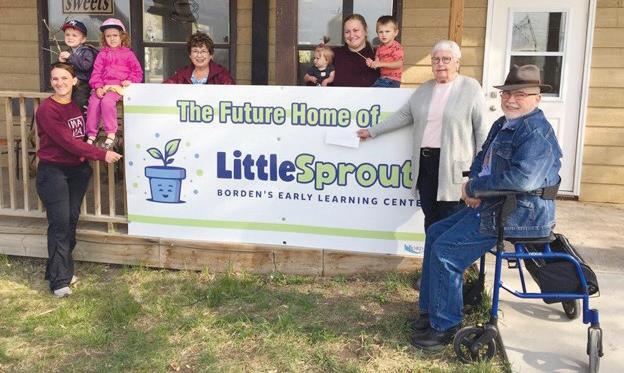
to donate the funds to complete the fence before the learning centre opened. In the picture are, from left, Emiley Saunders, Daniel Saunders, Rylie Saunders, Rector’s Warden Sharon Assman, Everly Orchard, Jillian Orchard, Maverick Orchard, parish treasurer Sandra Long (with cheque), and the Rev. Sheldon Carr.
Student archivist taps into love of history
By Joanne Shurvin-Martin
REGINA — William Blais has been working on the Diocese of Qu’Appelle archives since early July, assisting archivist Trevor Powell.

Blais graduated from Monseigneur de Laval High School in June, and will be attending the University of Regina, studying Education and specializing in social studies, starting in the fall.
The diocese took advantage of the federal Young Canada Works (YCW) program, which sponsors employment programs for students between the ages of 18 and 30.
Those eligible must be registered as a high school or a university student in the semester preceding the work assignment and returning to studies in the fall.
Blais’ contract as a student archival assistant will continue on a part time basis until March 1, 2024.
Over the past 10 years, 21 parishes and churches in the diocese have been closed or re-
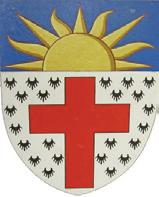
organized. These changes have resulted in a sharp increase in parish record intake for the diocesan archives.
Under Powell’s supervision, Blais determines what records and documents are of archival significance and need to be preserved in the archives.
He is particularly interested in documenting the Church’s mission and decision-making process at the parish level.
Through minutes, selected financial records and correspondence as well as other historically significant documentation such as parish registers, records of services, photographs and newsletters, Blais hopes to achieve this goal.
He says the most interesting part of the job has been seeing how many small details have been kept by parishes and says they really show the history of the church.
In addition to an interest in history, Blais is involved in basketball, having played two years of high school basketball, and is part of the Saskatchewan Lego Users Group.
Published by the Dioceses of Saskatchewan, Saskatoon and Qu’Appelle. Published monthly except for July and August.
Whole No. 292, Vol. 52 No. 1
A Section of the Anglican Journal
SUBSCRIPTIONS
For change of address, undeliverable copies and subscription list updates, contact:
• Your parish
• e-mail: circulation @national.anglican.ca
• Or send to Saskatchewan Anglican, c/o Anglican Journal, 80 Hayden Street, Toronto, Ont. M4Y 3G2
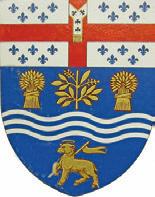
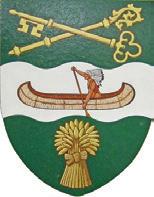
RATES
$10 in Canada
$17 outside Canada
SUBMISSIONS
Submissions for the October issue must be received by the diocesan editor no later than Aug. 28. All pictures must be sent as JPEGS and 1 MB (megabyte) in size.
CONTACT
INFORMATION
Managing Editor: Jason Antonio SKAnglicanEditor@gmail. com
1501 College Ave Regina, Sask., S4P 1B8 Phone: 306-737-4898
Qu’Appelle: Joanne Shurvin-Martin joannesm@myaccess.ca
6927 Farrell Bay Regina, Sask., S4X 3V4 Phone: 306-775-2629
Saskatoon: Peter Coolen ptrcoolen@sasktel.net 820 Avenue I South, Saskatoon, Sask., S7M 1Z3 Phone: 306-244-0935,
Saskatchewan: Mary Brown mary1949brown@gmail.com
Box 25, Shellbrook, Sask., S0J 2E0 306-922-5159
Advertising agent: Angela Rush saskatchewan.anglican.ads@ gmail.com 905-630-0390
PUBLISHING DETAILS
Published from 59 Roberts Place Regina, Sask., S4T 6K5
2 The Saskatchewan Anglican September 2023
Photo courtesy Lorraine Olinyk
William Blais works on a box of documents for the Diocese of Qu'Appelle archives.
Photo by Cindy Seiferling
The Bishop's Corner For everything there is a time
By the Right Rev. Rodney Andrews, D.D. Interim bishop for the Diocese of Saskatoon

Editor’s note: This message has been adapted from the one that appeared in the Country Guide, Canada’s National Farm Magazine, Feb. 28 edition. The church of St. Augustine’s, Rosthern, mentioned in this message has now been rented to a nonAnglican congregation; its story as a House of God serving the community of Rosthern continues.
Shortly before Bishop Chris Harper moved to his new position, he presided at a service of deconsecration for St. Augustine Church, Rosthern. It was a difficult task for him. It was difficult for everyone who loved that church and worshipped there. There are not enough supporters to keep the church open. The remaining members will attend another church. At the end of the service, the bishop read a statement saying the church is no longer set aside for worship and
can be sold or otherwise disposed of. That morning every tree and bush was covered with frost. Snow fell lightly. Few vehicles moved on the streets of Rosthern. The setting was beautiful. The purpose of the service sad. I sit on the right side of the church. I enjoy the beauty outside and the beauty inside. Above me is a brass plaque with the names of church members who served in the First and Second World Wars. Thirty or 40 volunteers are named.
About half did not return from overseas. They are buried on another continent. I visualize farm boys from Saskatchewan, some teenagers, others in their 20s.
There are similar plaques in churches, community halls, schools and Legion halls across Canada. The war effort was enormous and the loss was tragic.
Usually, we contemplate these
themes in November. Russia’s unjustified attack on Ukraine, with huge loss of life, destruction of property and unnecessary relocation, causes me to reflect.
Is there ever a justification for going to war? Is there an acceptable reason for making war? All world religions advocate peace yet “wars and rumours of wars” have led to death and destruction for thousands of years.
There is a difference between a “smash and grab” war or a badtempered act of revenge, and a “Just War” where the cause is considered sufficient.
In the Second World War, Hitler had taken most of Europe, millions of Jews had been murdered and the world was threatened with a police state, a reign of terror and concentration camps.
I contemplated these questions when the Rev. Canon Colin Clay died in July 2022. Colin was a complex person when it came to questions of war and peace. As a young man, he was drafted into the British Army. He was sent to the Korean War where he was a radio operator.
If he was not already convinced of the futility of war, Colin returned a strong and vocal antiwar advocate. He joined “Veterans for Peace.”
Colin was a friend of the veterans. He was chaplain for
several veterans’ organizations including the Regina Rifles and the Korean War Veterans. He led community services on Nov. 11. He and other veterans visited schools where they answered questions on the ethics of war. He joined a political party with an anti-war bias.
Ernie Hildebrand is a retired Mennonite pastor who raises sheep in Manitoba. He sent me his book, “Guiding Diverse Flocks.” Ernie is a committed pacifist. He has said:
“I write letters to prime ministers protesting the militaryindustrial complex of weapons production supported by government policy.”
Ernie sees inconsistencies in government practices.
“In times of war there are immediate shortages of food, safe housing, schools, and jobs, but it’s rare that the supply of weapons runs out. There are always more bullets and bombs in supply. Thus, I continue to protest. I also try to maintain a balance. I applaud the good in life. There is much to celebrate.”
The prophet Ecclesiastes says there is “a time for war, and a time for peace.” Is it too much to hope and pray the pendulum will swing to peace?
Suggested Scripture: Ecclesiastes 3:1-8, Matthew 24:3-8
... Peers left mark on national church during 30 years of leadership
Continued from page 1 at the cathedral in Regina.
“Michael’s style as bishop was consultative. In meetings with the archdeacons and rural deans, he would raise an item for discussion, listen to the discussion without entering into the debate, and when the discussion had gone on long enough, he would summarize what he had heard, and a decision, based on the often wide-ranging discussion, would be made.
"There were several occasions when he informed us, as we discussed incumbency vacancies in the diocese, that there were worse things than vacancies. Michael strove to attract capable and energetic postulants and clergy for the diocese.”
Cowan continued: “Qu’Appelle, with the Diocese of Kootenay, was a forerunner in the early days of liturgical renewal.
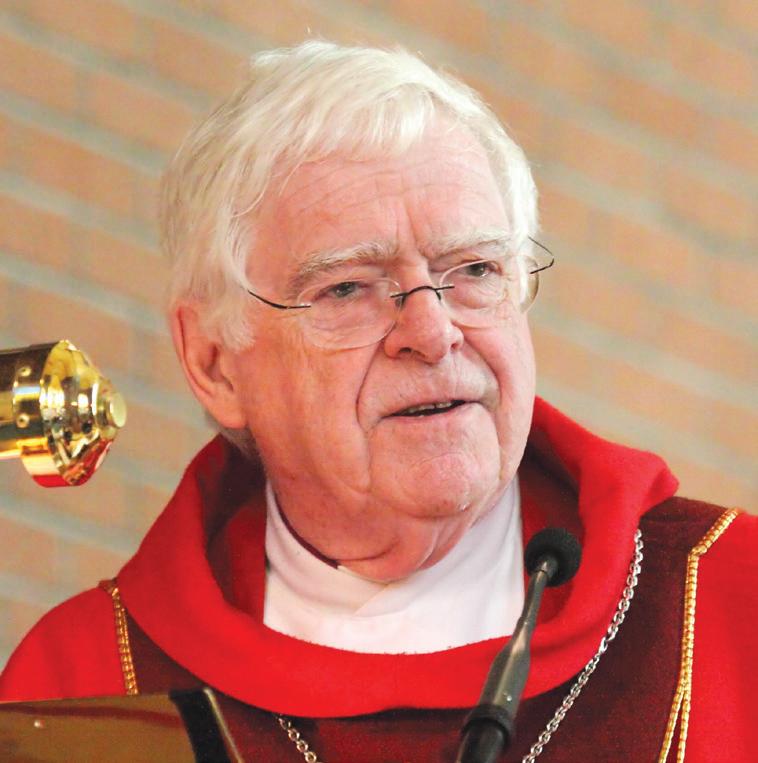
"The Qu’Appelle Rite and the Trial Liturgy
in the mid-1960s, were among the earliest of modern liturgies, in both Canada and the Anglican Communion.
"The advent of the Book of Alternative Services was welcomed in Qu’Appelle, but Michael wanted to ensure an educated uniformity in its introduction and use.”
General Synod sponsored a conference on how to use the BAS, which clerical and lay delegates
from Qu’Appelle attended, and then led introductory workshops across the diocese. Only then did the bishop give permission for the BAS to be used in parishes, and, says Cowan, “The book was widely welcomed.”
Another significant change in which occurred while Peers was bishop was the ordination of women. In 1978, in his first charge to Synod, Peers asked the Synod “to determine if the time was ‘now’ to ordain women in the diocese.
He said that he was not asking for permission to ordain women, that as a bishop in a Church that did ordain women, he already had that permission and right. He was asking for advice on timing. Synod advised him that the time
was right, and based on that advice he proceeded to move ahead.
“When Archdeacon Betty Garrett, the first woman to be ordained in Qu’Appelle, was to be ordained, Michael consulted with the diocesan chancellor, and together, they prepared a statement to respond to any objection to the ordination, based on the gender of the ordinand.
"Michael consulted with me, as diocesan master of ceremonies, and with Duncan Wallace, as Dean, as to what would be done liturgically if there were an objection.
“None of these preparations were needed. No objections to Betty’s ordination — or the other women’s ordinations — was ever made.”
Later, when Peers was metropolitan of Rupert’s Land, the issue of women bishops was raised. Peers went through the canonical reasons that would preclude
any candidate being nominated, and then the qualifications that were required for nomination. When told the female priest had met all the requirements, Peers said there was no reason that she could not be nominated.
Cowan said, “While no women were elected bishop in the province in Michael’s time as metropolitan, his process was adopted by the other metropolitans and provinces, and the General Synod never did have to debate and decide the issue.
“As bishop, Michael Peers, brought the Diocese of Qu’Appelle happily and efficiently through many great changes in the life of the Church, and through his teaching and example laid the groundwork for us to deal with other of the changes that were to come.”
For more coverage of the archbishop's death, see page 6.
September 2023 The Saskatchewan Anglican 3
Archbishop Michael Peers, circa 2010. File photo
... New cathedral rector
Continued from page 1 conversations with people about a wide variety of topics, learning new things, and laughing often. In my free time I read and write (usually with coffee in hand), and spend time with my two large (goofy) dogs. I canoe and snow-shoe, travel, and try new things.
I am very excited to join such a vibrant and positive church, with your ministries of community engagement, music, intergenerational activities, collaboration, and celebration. I am heartened and enthusiastic to see where God will lead us, and how we extend the love of God to the beautiful city!
As we look expectantly to the future, let us give thanks to God for the abundant grace that has brought us here. I look forward to being with you in person very soon!
Blessings.
Psalm 16:11, You show me the path of life; in your presence there is fullness of joy, and from your hand flow delights for evermore.
Rev. Wendell Brock says farewell to Prince Albert
By Kathleen Stewart
PRINCE ALBERT
— The Rev. Wendell Brock’s position in the Diocese of Saskatchewan came to an end on Sept. 1.
In April his work in the Diocese of Saskatchewan took a different direction with his official title being the Bishop’s curate, since he had been doing monthly services in Cumberland House, Ahtahkakoop and Arborfield and filling in where needed.
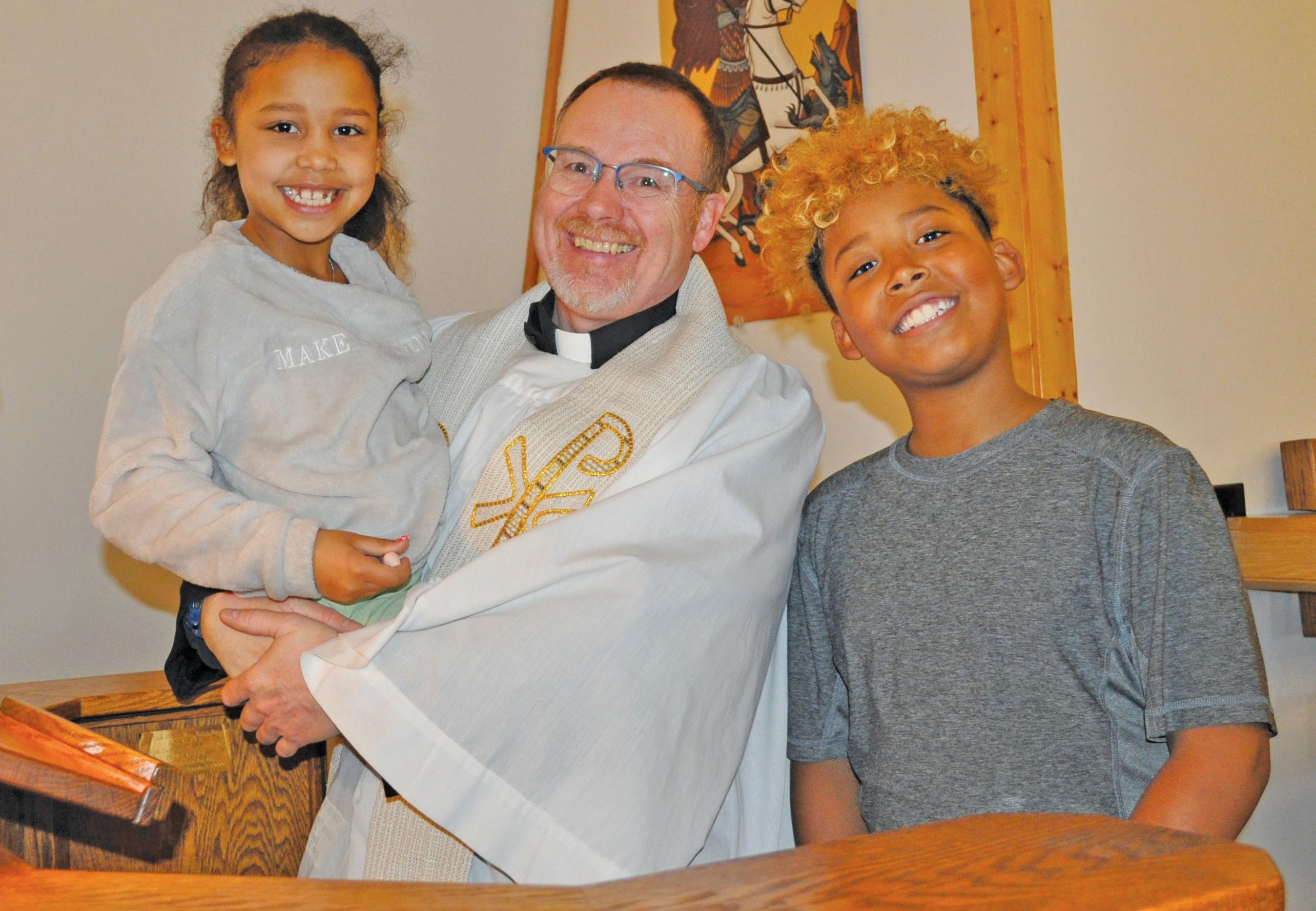
On April 21 at a farewell service for Brock, the rector’s warden, Kathleen Stewart, recited the following: “On behalf of the parish and vestry I (we) offer words of thankfulness and praise (to our Rector, Wendell) from the words and song written from Ecclesiastes, ‘To everything turn, turn, turn, there is a season, turn, turn, turn, and a time for
every purpose under heaven.’ …thank you for sharing a season with us.
"Thank you for sharing the Gospel and your knowledge with us. He was given a gift of a patten travel case, with loaves and fishes on it, to share the Bread of Life and continue in faith and the future to feed others (and
to look after widows and orphans).
"The congregation were thankful for his service in the Diocese of Saskatchewan and for gathering them, as unworthy as they are, under the Good Shepherd. God bless you Wendell and bless your beautiful family. May God bless
your next season and your duties.”
Wendell and his family will stay in P.A. and rent the rectory from St. George’s. His children will continue their schooling in P.A. and his wife Odda will remain in her occupation. Wendell has a few job offers and is contemplating his next move.
D I O C E S E O F S A S K A T O O N E V E N T S
Announcements for September 2023
g Saskatchewan Anglican online! Did you know you can read current and past issues of the Saskatchewan Anglican online?
Visit www. anglicandiocesesaskatoon. com/saskanglican or on Facebook at www.facebook.com/ saskatchewananglican
g Please note that if you are considering attending any church service in person , please check on service availability and any requirements for preregistration that may exist.
If attending services, please follow all the indicated seating, movement, distancing, masking, and sanitization instructions.
g Licentiate in Theology Courses offered by College of Emmanuel
and St. Chad and Western Education Collaborative Anglican Network (W.E.C.A.N.):
Emmanuel and St. Chad College has been collaborating with the WECAN group to develop a ministry preparation program that is relevant to the various Anglican contexts in Western Canada.
The local diocesan ministry schools make substantial contributions to the program by offering courses mapped out in the ESC-WECAN Licentiate in Theology handbook.
Whether you are feeling called to do more formal ministry or are drawn to taking certain courses, please contact the person named for the course or courses you are interested in doing.
At the same time, let
your diocesan school co-ordinator know your plans. If interested, please review the detailed list of fall and winter course located elsewhere in this issue.
g STU/ESC course offerings for this fall and winter:
Who is the Church?
Taught by the Rev. Dr. Iain Luke, Sept. 11-22
Introduction to Biblical Literature with Dr. Adam Wright and Dr. Bernon Lee, Nov. 13-24
Spiritual Practices Cultivating Compassion and Resilience, with the Rev. Dr. Trish McCarthy, Dec. 4-8 and Jan. 8-12, 2024
Gospel of Mark, with Dr. Adam Wright, Jan. 8-12, 2024
Global Anglicanism in Practice with the Rev. Dr. Iain Luke, Sept. 25 through Dec. 15 (weekly class)
Please call 306-975-
3753 for more details and please also see the note elsewhere in this issue, which provides more background and information on these course offerings.
g Out of the Depths — Living in Hope: A Lutheran-Anglican Women’s retreat will be held on Saturday, Oct. 21 from 9:30 a.m. to 4 p.m. at Emmanuel Anglican Church, 607 Dufferin Ave., Saskatoon. Registration is $20; bring your own lunch (also please see the notice posted elsewhere in this issue).
Appointments, etc.
The Rev. Dr. Laura Marie Piotrowicz (pronounced: pea-ohtrow-vitch) has accepted the position as rector of the Cathedral of St. John the Evangelist. She is expected to begin in this new position in the
early fall. Let us pray for Laura Marie as she prepares to lead her new family at St. John’s. A picture of Laura Marie and a letter to her new parish is included in this issue.
g To be included in a timely manner, brief notices should be supplied to the associate editor by fax, email or “snail mail” by the end of the month, one month before the month in which the insertion is desired (i.e. February entries will be in the April issue).
Detailed and longer texts of upcoming events will not be included in this section, but should space allow, could be the subject of articles and notices elsewhere in the Saskatchewan Anglican.
4 The Saskatchewan Anglican September 2023
Rev. Wendell Brock (centre) with two of his children, after his final service.
Photo by Kathleen Stewart
Lumsden's ecumenical Halo Project serves community's needs
By Louise Holloway and Shasta Mund
LUMSDEN (Qu’A) — All five churches in the town of Lumsden — All Saints’ Anglican, St. Peter’s Roman Catholic, Shepherd of the Valley Lutheran, St. Andrew’s United and Rock of the Valley Community Church — are involved in the Halo Project to help those in need in the town and surrounding area.
The group organized a very successful garage and bake sale, held on the parking lot of St. Peter’s Church.
The proceeds of the sale will fund a bursary to help a resident gain education to obtain secure employment. Organizers say the sale was a good opportunity to get to know other Christians in the community and to pave the way for collaboration on future initiatives.
Organizers from the Halo committee pose with some of garage sale offerings. From left Kim Skidmore, Patrick Reimche, Shasta Mund, Steve Juby, Jan Liebel, and Louise Holloway. Mund and Holloway are members of All Saints Anglican Church; the rest are from the other four Lumsden churches.


Diocese of Muyinga in Burundi elects new bishop
By staff
MUYINGA, BURUNDI
— Rev. Canon Jean Berchmans Mweningoma has been elected as the third bishop of the Diocese of Muyinga in Burundi, with his consecration and enthronement held on June 11 in a “joyous function” where God's presence was keenly felt.
The Diocese of Muyinga is a partner with the Diocese of Qu’Appelle.
“I take this time to let you know that I appreciate the good partnership that exists between the Diocese of Muyinga and the Diocese of Qu’Appelle,” Mweningoma said in an
email to Bishop Helen Kennedy, “and I look forward to working together with you in order to strengthen this partnership. I request that you keep me and the Diocese of Muyinga in your thoughts and prayers.”
Bishop Mweningoma replaces Bishop Paisible Ndacayisaba, who resigned recently after leading the diocese from December 2013.
The new 47-year-old bishop was baptized in 1976 and confirmed in 1995. He was ordained a deacon in August 1999 and a priest one year later. His religious training
started in Matana Theological School before attending Butare-Rwanda University and the School of Theology at University of the South, Sewanee in USA where he graduated with an M.A. in theology.
With a master in sacred theology, the bishop served as senior pastor of Gatukuza Parish; he has also been an archdeacon of Buye and was the dean of All Saints Cathedral of Buye. The Diocese of Buye entrusted him with community development responsibilities.
Bishop Mweningoma attended several workshops and courses related to peace,
psychological issues, gender and development, project management and ministry within and outside the country.
The consecration ceremonies were honoured by delegations from Rwanda and Kenya and special messages were sent from United Kingdom and from the University of the South, where Mweningoma did his masters in theology.
Among his main objectives presented to the public, are: the sharing of the Gospel, capacity building of clergy members, and supporting community development, particularly the most
disadvantaged.
In his sermon, Bishop Musavyimana from the Diocese of Kigeme in Rwanda urged the new bishop to stay focused on the successful leadership by developing the qualities of a good leader. He stressed that a good leader always thinks about the end of his leadership and highlighted that a Church leader must stay humble and bear in his mind that he has been called to be a steward of God’s purpose.
“You will succeed if you only rely on the power of God. The only battle you’re called to fight is the battle of faith,” said the bishop of Kigeme Diocese.
September 2023 The Saskatchewan Anglican 5 D I O C E S E O F Q U ’ A P P E L L E
Customers look for bargains at the garage and bake sale held by the Halo Project, an ecumenical group in Lumsden that raised money for an educational bursary for a resident.
Photos by Georgina Flavel
Clergy recall the wisdom and friendship of Michael Peers
By staff
Past and present clergy in the Diocese of Qu'Appelle recall Archbishop Michael Peers and his time as the bishop of the diocese.
Bishop Helen Kennedy, in a letter to the diocese announcing the death of Bishop Michael Peers, wrote in part:
“His ministry included being a strong advocate for the Book of Alternative Service. He is a signatory to the Waterloo Declaration, which brought the Anglican and Lutheran denominations into a full communion covenant.
“He was the primate in 1993 who delivered an unreserved apology to the National Native Convocation in Minaki, Ont., for the Anglican involvement in Indian Residential Schools.
I am grateful for his ministry in the Diocese of Qu’Appelle.
When I was at Trinity, the only three women in my year all walked away before graduating in 1980. (We did graduate later.) There were no bishops who would even interview us, as there was such caution. Michael was the one bishop who had no positions available but kept the door open.
The three of us went into lay ministry opportunities and I was grateful to fall back in love with ministry.
I was a chaplain at McMaster when I reconnected with Michael, who then agreed to take a chance on me (his words!) He flew me out to Big Country Parish, telling me that he would gauge their acceptance.
Apparently Michael told the parish that the decision would be mine. That gentle mutuality set the tone for an amazing experience of ministry for everyone.
Michael was only my bishop for three years, but that began over 40 years of a professional and personal relationship for which I am forever thankful.
I consider my 25 years in the Diocese of Qu’Appelle as the most formative in my development as a priest.
Telmor Sartison, then-national bishop of the Evangelical Lutheran Church in Canada, and Archbishop Michael Peers, then-primate of the Anglican Church of Canada, celebrate after signing the Waterloo Declaration in 2001.
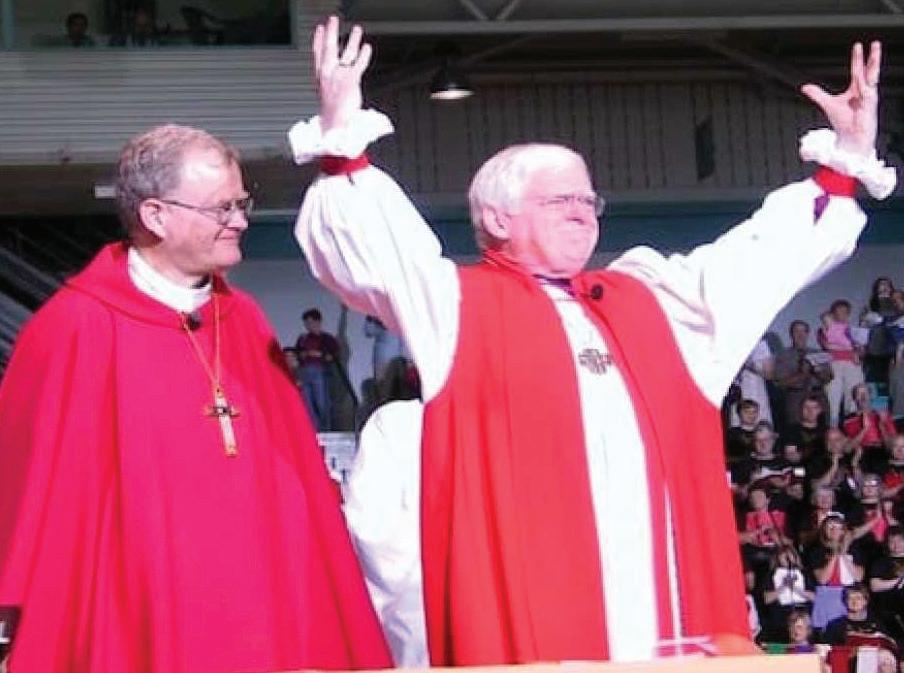
I learned so much from the people, and Michael Peers set the tone for that kind of respect. He knew everyone by name and listened attentively with deep authenticity. Michael created an atmosphere of collegiality among the clergy that brought the best out of a diverse leadership.
And such a man of words; taking care to be broadly inclusive in a way that took everyone to a higher level in conversation and action. I was inspired that
intelligence could be rooted in compassion.
Full retirement seems to be elusive for me. At present, I am back to my beginnings, serving at St. George, Grafton, a small rural community outside Toronto. I live in Cobourg, overlooking Lake Ontario. When I visit people I am able to look over wheat and corn fields.
Although on a smaller scale, I feel connected to my Prairie roots.
Rev. Helena-Rose Houldcroft is one of the first women priests whom
was to be followed by the dedication outside.
The sky looked as if a storm was immanent and, as we were robing, the archbishop commented that if it was raining when we went out after the service, he would remove his cope and mitre to save them from being soaked.
When the time came, we went outside in a heavy rain, the archbishop remained clad in his cope and mitre. Returning to the church, I asked the archbishop why he had not removed his vestments. His comment was: “What are we about, anyway!”
When I went on to Alsask to do Evening Prayer, I had to wring the water out of my cassock and surplice before I could robe. The archbishop’s cope and mitre would obviously have been in a similar condition.
Another story from Rev. David Nevett is not humorous, but illustrates how Bishop Peers supported his clergy.
Archbishop Michael Peers was very supportive of his clergy. In the early years of my ministry in the nine congregations of Big Country Parish (Kindersley and area), the newly-elected president of Kinrose Deanery A.C.W. was shot to death in her farm home.
The archbishop was at several days of meetings in Saskatoon. He came out to Kindersley every evening and stayed with me and returned to the meetings each morning. The archbishop officiated at the funeral, assisted by the Regional Dean, the Rev. John Allen, and myself. The archbishop’s support was greatly appreciated.
Bishop Michael Peers ordained. From 1983 to 2007 she served the parishes of Big Country, BalcarresCupar, and St. Philip, Regina.
Rev. David Nevett
It was on a summer afternoon in the mid 1980s, that Archbishop Michael Peers came to dedicate the new cemetery gates at the little prairie church of St. Catherine’s, Prairiedale, which was part of Big Country Parish. The worship in the church
Archbishop Peers was also supportive of parishioners of the diocese. In 1984, there were a number of prairie fires, including one in the Kyle and Beechy area. Keith and Eleanor Taylor farm and ranch in the area.
With little time to pack and leave, the fire swept through their yard destroying the house, barn, and riding arena. Soon after the fire, Keith and Eleanor received a hand-written letter in the mail from Archbishop Peers expressing care and concern, and mentioning that he would keep them in Continued next page
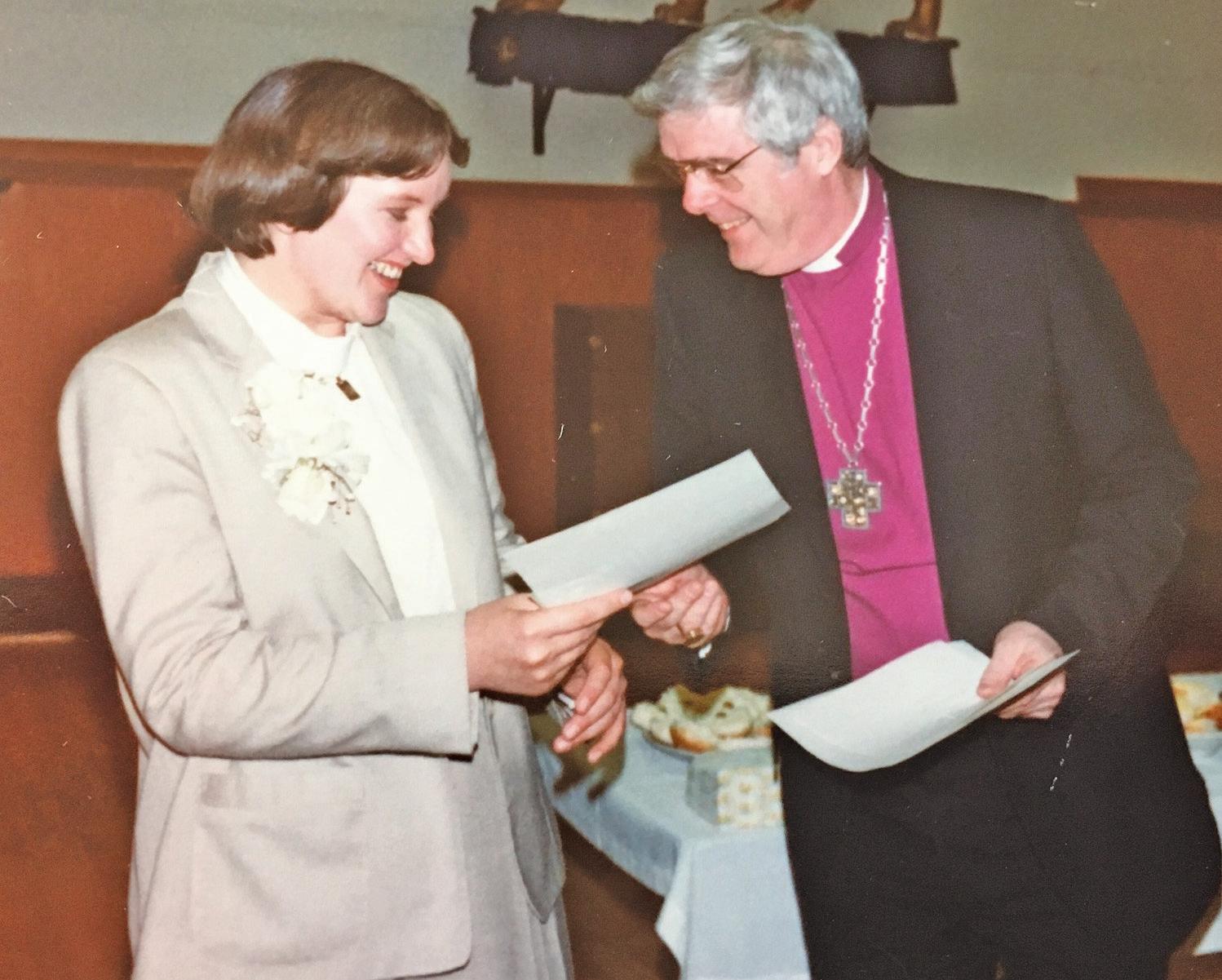
6 The Saskatchewan Anglican September 2023
Rev. Helena-Rose Houldcroft and Bishop Michael Peers share a moment after he ordained her in the early 1980s.
Photo courtesy Facebook
Rev. Helena-Rose Houldcroft
Photo courtesy Facebook
... Clergy remember Peers
Continued from page 6 his prayers. That letter is still one of their treasured possessions.
Rev. David Nevett served the parishes of Lakeside, Abernethy-Balcarres, Big Country, and Chinook before he retired in 2004. In his retirement he has filled in at several parishes which were without clergy, and is licensed to conduct services at Beechy, Kyle and Lucky Lake.
Rev. Patrick Tomalin
Michael was a bishop, a pastor, a mentor and a friend. Many of the Qu’Appelle clergy of his time would say the same thing. He was my bishop and I was always aware of the authority he commanded as bishop. This was the authority of example and suasion; it was never heavy-handed. Nor did he beat about the bush. When he appointed me to a “difficult” parish, he said, “Either bring it back to life … or bury it.” He was respected for that honest and practical approach.
Above all Michael was a pastor. He was the pastor to his clergy, always ready to listen, aways ready to counsel, to sympathize, to guide and to support in prayer. But it was not just the clergy whom he pastored. He was available
Editor thankful to attend national newspaper conference
By Mary Brown
until 2027.
to anyone within or beyond the diocese.
On one occasion, for example, when I was unable to officiate at a wedding, he came to the parish himself and presided over that wedding.
Michael was a mentor to me, to the other clergy, and to anyone who would benefit from his wisdom and guidance. He was approachable and compassionate. His advice was always practical and sound.
Michael was a true friend. His way of relating to others made one feel respected, safe and valued. “I am the boss” was not in his vocabulary, nor was it his style.
When I was editor of the Saskatchewan Anglican and needed to stay overnight in Regina to complete a monthly issue, Michael and Dorothy frequently welcomed me into their home.
I was honoured to work with and for Michael, my bishop, my pastor, my mentor and my friend.
Rev. Patrick Tomalin served the Qu’Appelle parishes of Oxbow, Pipestone (Grenfell), Assiniboia and St. James Regina, before moving to Port Alberni in the Diocese of British Columbia in 2001. He was managing editor of the Saskatchewan Anglican for 18 years.
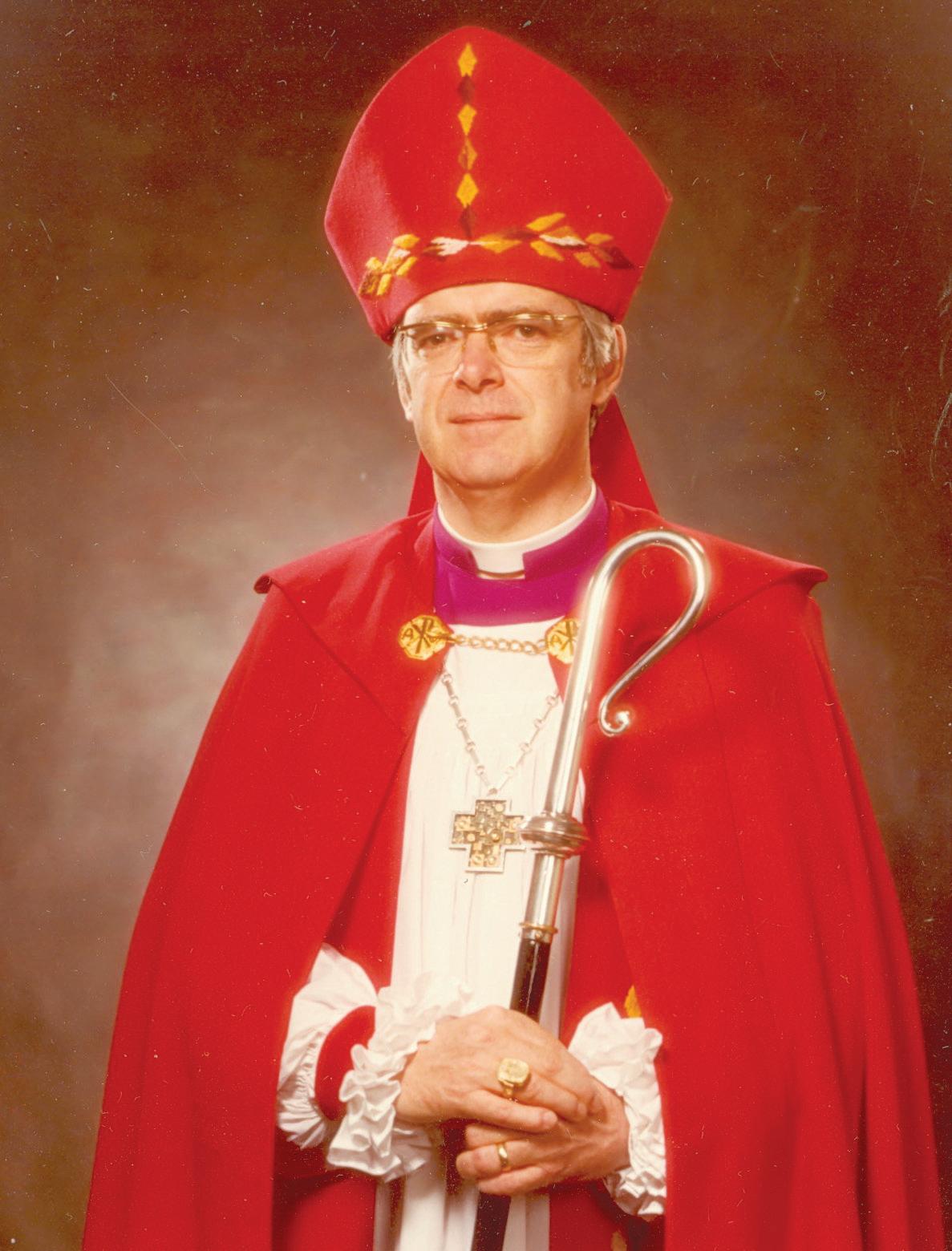
PRINCE ALBERT
— Most of the editors for the diocesan papers across Canada are members of the Anglican Editor’s Association. Every year they get together for an AEA Conference in different locations.
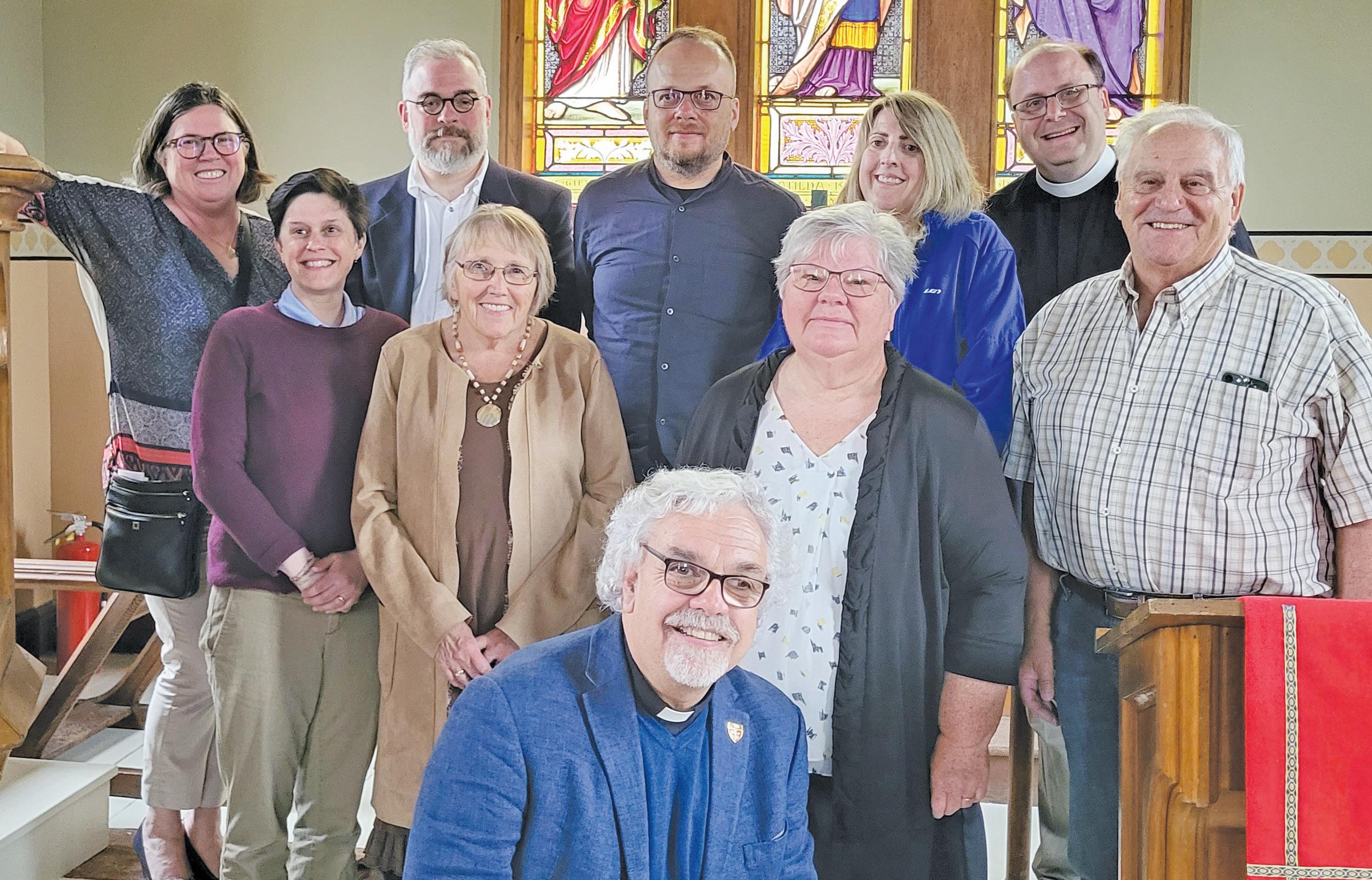
In Saskatchewan we take turns as there are three editors plus the managing editor. This year the conference was in Fredericton, New Brunswick and it was my turn to attend.
The conference went from June 1 – 3 and each day went from 9 a.m. till 5 p.m. We met in Christ Church Memorial Hall right beside the cathedral.
First on the agenda was a very interesting tour of the cathedral. Mark Hauser, via Zoom, did a presentation on video production best practices, introducing participants to different programs and applications.
Mark concluded his presentation on the last day by putting together a production using videos that we took with our phones on the first day. There was a discussion panel via Zoom with ACC reps, Joe Vecsi (ACC communication director), Alicia Brown (ACC comms) and Tali Folkins (Anglican Journal editor).
There are at present 16 diocesan papers being printed. Joe Vecsi noted the Anglican Journal print version in its current form will probably be available
Janice Biehn, representing PWRDF, told us that they will be changing their name, with a cross-country committee working on it. Margaret Glidden, president, gave her report stating that there are 21 editors and three associate editors who belong to the Editor’s Association.
The Rev. Matt Koovisk, treasurer, reported that the bank balance is healthy, noting that the only income is from the dues each diocese pays determined by seven cents per subscriber.
Day 2 started with a Downtown Heritage Walking Tour. We visited one of Fredericton’s earliest surviving houses built in 1787.
Marcel Lebrun, guest presenter, gave us an overview of his project 12 Neighbours (affordable housing and community building).
He has been instrumental in building small dwellings for homeless people in Fredericton. The afternoon saw a presentation from Giuliana Grillo de Lambert, St. Thomas University, Journalism Program, who spoke about newspapers versus web news.
Brian Bukowski spoke about the Anglican News Digital Platform, saying that 12 papers are online or about to go online. Scott Brubacher and Michelle Hauser
represented the Anglican Foundation, which has been in existence for 65 years and has dispersed $40 million in that time.
Before a banquet, hosted by the Diocese of Fredericton, we attended Evening Prayer in St. Mark’s Chapel of Ease at King’s Landing.
The Rev. Canon Walter Williams, vicar of the chapel, was the officiant, with the Archbishop of Fredericton and Metropolitan of the Ecclesiastical Province of Canada, David Edwards, as preacher and the Rev. Matt Koovisk, editor of the Mustard Seed and secretary of Synod, Diocese of Brandon, as organist.
On our last day we were given free time to attend the Farmer’s Market and then began the business session at 10 a.m. to discuss bylaws.
The executive members for the coming year are Margaret Glidden, president, Matt Koovsik, treasurer, Giselle McKnight, secretary, and Emily Rowe, memberat-large, and Janice Biehn, who will be on the executive for the next year as next year’s host for the conference in Toronto.
Hauser finished his talk on videos. The conference ended with Holy Communion at Christ Church Cathedral.
I was fortunate to be able to attend this conference and am thankful for being able to interact with other editors across Canada.
September 2023 The Saskatchewan Anglican 7
Bishop Michael Peers, shortly after he became bishop of Qu'Appelle in 1977.
Photo courtesy General Synod archives
In back are Janice Biehn, Rev. Jonathon Rowe, Brian Bukowski, Margaret Gliddon, and Rev. Matt Koovsik. In front are Emily Rowe, Mary Brown Giselle McKnight, George Cripps, and Archbishop David Edwards. Photo submitted
General Synod delegates reflect on the 'greening' of the Anglican Church of Canada
Between June 27 and July 2, Anglicans across Canada met for the 43rd session of the General Synod of the Anglican Church of Canada, held at the University of Calgary.
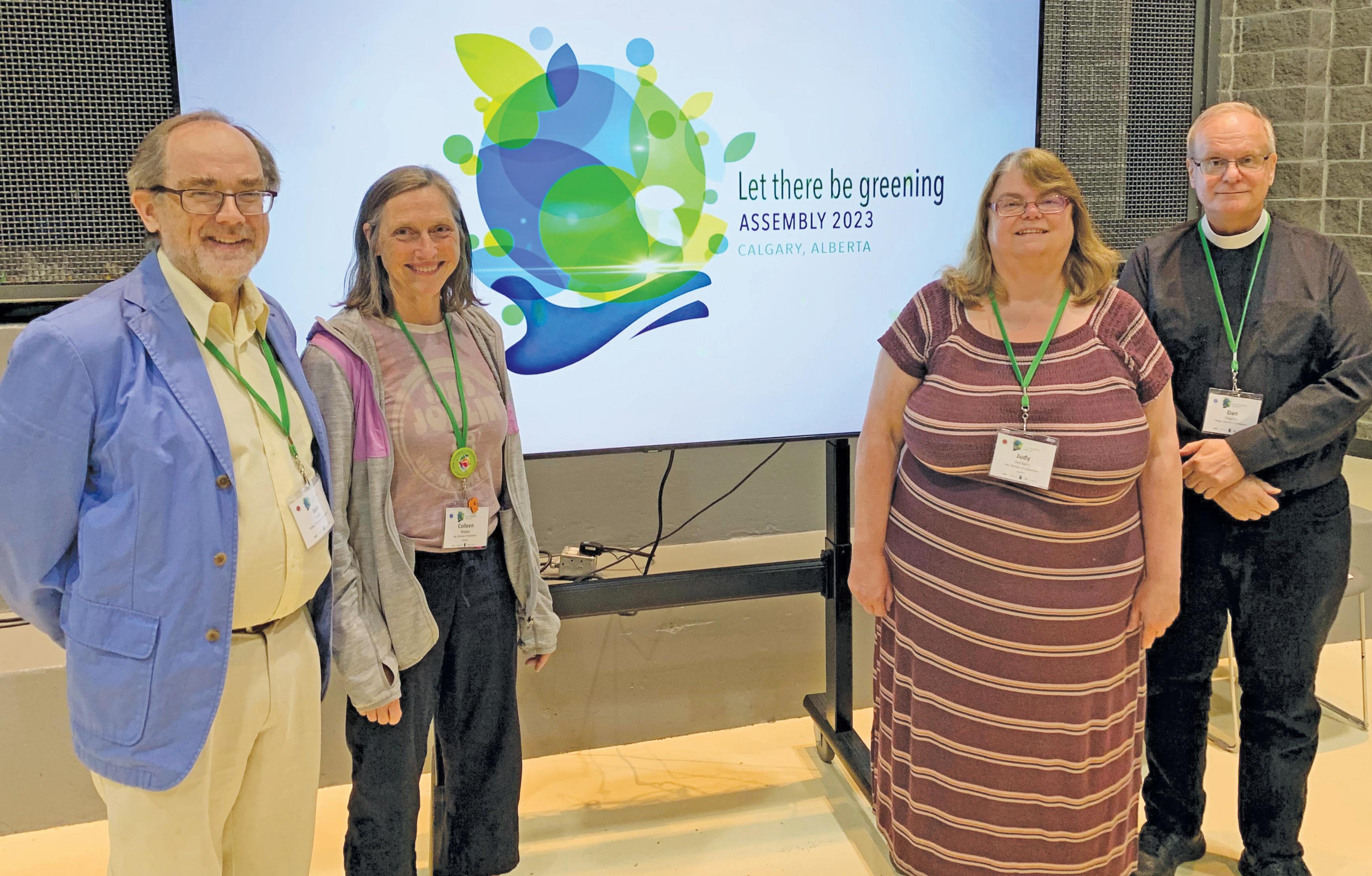
Several of the sessions were held together with delegates from our full communion partner the Evangelical Lutheran Church of Canada, in meetings simply called Assembly.
The theme of the General Synod was “Let There be Greening,” which expresses a prayerful desire to grow as a church and care for God’s creation.
By Archdeacon Daniel Hughes, Saskatoon
Much was discussed, debated, and voted on, much more than can be reported here. But here are a couple of highlights from one delegate.
Before any of the sessions began on the first evening, Anglicans and Lutherans gathered outside to participate in a smudging ceremony, which Indigenous Church Archbishop Chris Harper explained and led.
The General Synod opened and closed with a celebration of the Holy Eucharist. Each day was held in prayer morning, mid-day, and evening along with daily Bible study at each table.
Praying and singing with hundreds of Christians from across the country is a very uplifting and powerful experience!
During the General Synod members from the Anglican Indigenous Church spoke of Sacred Circle, which is the governing body of the Indigenous church. The General Synod celebrated the emerging selfdetermining Indigenous Church, which is taking steps in its establishment. Another highlight was the discussion and unanimous agreement that we should add the Moravian Church to the full communion agreement that already exists with the ACC and the ELCIC.
During a poignant ceremony at one of the Assemblies, leaders
representing the Anglican Church of Canada, The Evangelical Lutheran Church in Canada, The Evangelical Lutheran Church of America, and the Episcopal Church of America exchanged four symbolic chalices that were on the altar that was situated in the centre of the auditorium.
To be called by the church to be a delegate to General Synod was a privilege and wonderful way to learn more about the church at the national, international, and ecumenical level.
May God bless the work that was done at General Synod and our church as we walk as disciples of Jesus Christ our Lord.
Alex McPhee, Qu'Appelle youth delegate
In many ways General Synod felt like camp for adults ... travel exhaustion, a grueling schedule, three daily meals together, a lot of pastors struggling to keep up with everything going on, and perhaps some avoidable drama on the floor.
I was impressed by the diversity of our church and was very happy to speak in favour of two
consequential resolutions that passed — the approval of a transgender name change liturgy, and full communion with the Moravian Church.
Through sheer coincidence, I was confirmed Moravian when I was growing up in Edmonton, and I ended up being the only synod delegate nationwide with any Moravian background. After my speech, I was tracked down all week by people shyly asking, "What is the Moravian Church?"... a question I am happy to answer anytime.
As for the transgender name change liturgy, it is a rather beautiful piece of prose, solidly grounded in Scripture. Try using it as a tool for evangelism: most atheists (especially the young ones in your life) just don't know anything about the values of our Church, and I've gotten great results showing this document to people.
The most uncomfortable part of Synod, of course, is just having to witness a lot of sublimated conflict in the church. All parties can become rather devious on the floor, and will couch their political concerns in euphemistic language
about procedure and tradition. In this difficult environment, I would say that the delegates from our diocese all conducted themselves with honesty and integrity.
Despite the challenges, our pluralism and our internal democracy are two things that make me proud to be Anglican, and both of those qualities are still intact after another General Synod.
Rev. Winna Martin, Qu'Appelle clergy delegate
General Synod is more than just a large convention encompassing representation from across the vast Canadian spectrum. It is an opportunity to connect with fellow Anglicans, and for the second time fellow Lutherans — to discuss, learn, discern and broaden our understanding of the work and mission of the church beyond our limited borders.
It is a privilege to have be chosen to represent our diocese and I feel our delegation truly gave an excellent representation of the diversity of the church here in Qu’Appelle.
We were young, middle aged and “older,”
clergy and lay, rural and urban, but all actively involved in our parishes and communities and all united in our desire for a stronger, healthier and welcoming Anglican Church for everyone.
I am proud to still be given the opportunity to serve the church here in Qu’Appelle and beyond and I was proud to be in the company of Anglicans and Lutherans who might not all believe as I believe but who are engaged and active Christians determined to make a difference and grow the church where they are planted.
Wendy Hodges Godfrey, Qu'Appelle lay delegate
General Synod was an awesome experience! It was really interesting to see how the church operates at the national level. I loved meeting people from all over the country.
Even though there are differences, we worship together in such a similar way, it brings us so much closer! Seeing and hearing first hand, the struggles our First Nations people encounter every day was eye opening and very humbling.
8 The Saskatchewan Anglican September 2023
Delegates from the Diocese of Saskatoon who attended this year's General Synod were, from left, the Rev. Dr. Iain Luke, Colleen Walter, Judy Herbert and the Ven. Dan Hughes.
Photo by Ven. Dan Hughes
Tri-diocesan conversations about the future continue
By Joanne Shurvin-Martin
REGINA — Members of the diocesan councils from the dioceses of Qu’Appelle, Saskatoon and Saskatchewan met together in mid-May, continuing on the path towards supporting each other in ministry.
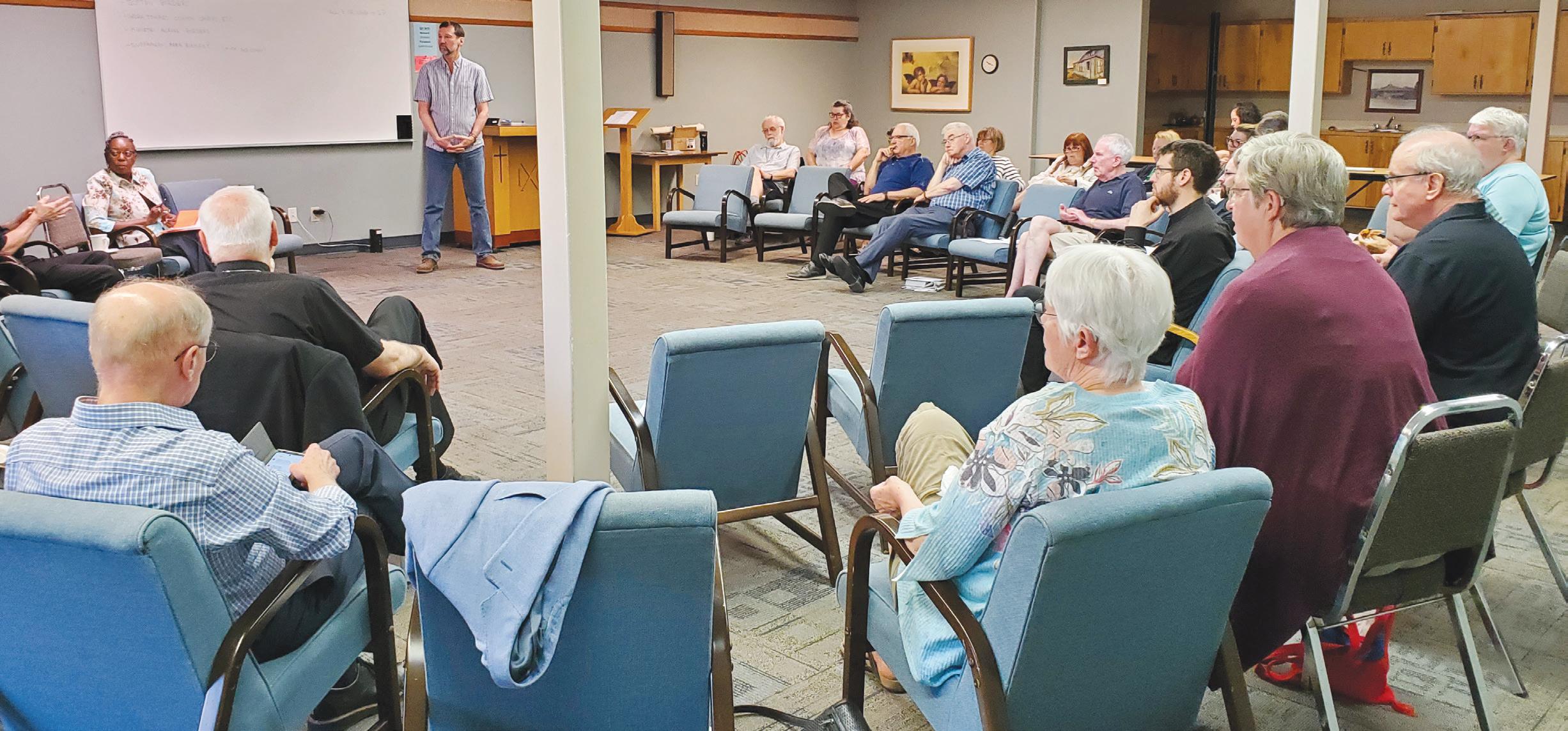
Bishop Helen Kennedy reported, “It was a fruitful time of worship, relationship building, and clear and open conversation.”
From the meeting, permission was given for licensed clergy to preside over services in other dioceses without seeking the bishop's permission.
Working groups were formed to explore several topics, and the findings will be reported to the next Tri-Diocesan Council meeting, scheduled for Oct. 16 and 17, again at Queen’s House, Saskatoon.
Topics being explored:
• Would there be
cost savings by combining payroll, investments, insurance and procurement?
• How are our canons similar or different? Can we move towards having
common canons? Can we support area suffragan bishops, and what would their role be?
• Can we collaborate on archival management?
• Can we work
together on ministry training and equipping?
• Can we share resources and the two church camps in the province for effective youth ministry?
• Ministry initiatives across diocesan borders have many possibilities
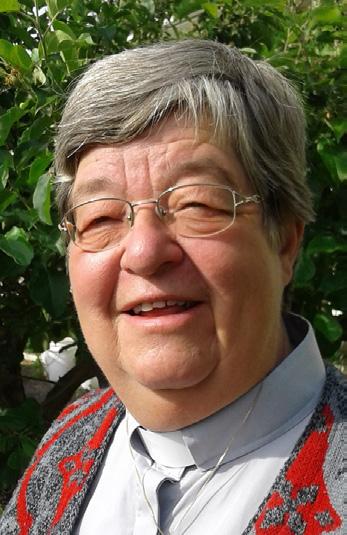
The working groups are focusing on archives, education, finance and camps.
Well-supported clergy can help grow healthy parishes
By the Rev. Canon Marie-Louise Ternier
At first glance, taking a course in clergy supervision may not exactly sound like an enticing venture. The title suggests that such a course is limited to a handful of senior clergy who take student ministers under their clerical wings.
And sure enough, only a handful of clergy took advantage of this learning opportunity. Pity really, for rich fare was offered from which every priest/ pastor and parish could greatly benefit.
From leadership development to conflict resolution to critical incident discussion, from ongoing spiritual formation, family systems theory in parish dynamics, supporting sermon development, to nurturing healthy congregations — there was no shortage of engaging topics with an abundant harvest of insights and learning.
I signed up for several reasons unrelated to supervising a seminary student in a field placement. The course presented a great
opportunity to engage in meaningful conversation with colleagues and presenters; on that front it did not disappoint.
I also have become quite concerned, not with adequate supervision in the formative stages of ministry, but rather with the seeming lack of appropriate mentoring post-ordination.
While ministry formation should provide ample support, guidance and supervision, once ordained one can feel rather cut loose from any ongoing intentional mentorship.
Even when postordination mentoring is promised to the newly ordained, the practical execution of that promise does not always materialize, especially when serving in a rural parish away from where senior clergy exercise their own ministry.
Moreover, I serve as a spiritual director to several persons in active ministry. On more than
one occasion I have had to switch hats when a pastor needed to debrief about a ministry situation that could have benefitted more fully from a supervisory relationship.
Post-ordination mentoring seems to have fallen by the wayside. Even with declining church membership and parish closures, the current clergy shortage makes the concept of a curacy a quaint thing of the past, especially here on the Prairies where distances are great.
More than two years of COVID-19 lockdowns and restrictions only exacerbated that situation.
I think here of colleagues ordained in COVID-tide with only the bishop and a couple of clergy present, all masked, while the service was livestreamed.
Colleagues could not be physically present to join the bishop in the laying of hands, a powerful tactile symbol and sign of collegiality and support.
Subsequently, such new priests could easily feel isolated when starting parish ministry, left missing a supportive clergy community when facing various challenges
in the parish. The COVID restrictions likely contributed to isolation, while efforts to reach out to the newly initiated shepherds of sheep might not have occurred as they used to in the past.
There are ways to address this, of course. Retired clergy are a rich pool of seasoned insights, wisdom and expertise. One retired priest in our clergy supervision course shared his desire to mentor a new priest.
However, he is uncertain whether his diocese taps retirees for this supportive role. It takes leadership and vision, training and intentionality to implement a mentoring ministry. Every diocese has a generous supply of retired clergy, some of whom may well desire to place their hard-earned and valuable skills at the mentoring service of the newly ordained.
While nothing beats in-person mentoring conversations, online video meetings can serve a helpful purpose when distance becomes an obstacle, especially once a good rapport has been established in a few initial
face-to-face conversations.
Whatever medium is used, the newly minted priest/pastor deserves reassurance that someone is committed to walking with him/her in this new leadership adventure, an adventure that, according to Rev. Dr. Peter Steinke’s description in one of his course presentations, resembles whitewater rafting in these rapidly changing and unpredictable times.
Whether bishop, priest or deacon, ordained leaders are called to excellence in their role as shepherd, teacher and guide of God’s faithful people.
As Bishop David Greenwood (Athabasca Diocese) said in his course presentation on leadership development, we are called to create a culture through words and actions, to embody and share the vision of God’s reign, and to provide a path to fulfilling that vision.
Well-supported clergy will contribute significantly to growing healthy parish communities that can become radiant beacons of God’s reign in our fractured and broken world.
September 2023 The Saskatchewan Anglican 9
Diocesan council members from Saskatchewan, Saskatoon and Qu'Appelle discuss the future during the second tri-diocesan meeting in Saskatoon in May.
Photo by Rev. Susan Anholt
Veteran gives uniform to museum during 100th birthday
By Mary Brown
PRINCE ALBERT — On May 5, Ed Laird celebrated his 100 th birthday and rented the Prince Albert Historical Museum for a party.
There were about 140 people there. What was fun was seeing all these people with name tags on that said their first name
and under it how they were related to Ed, such as cousin, grandchild, etc.
Ed had six siblings, one of them Ruby, who lived to be 103. His brother George came from Regina with his whole family. He has 21 nieces and nephews.
Ed and Gerry had three children — Tom, Grant and Geri Lynn — and between them they
produced 10 children, who produced 14 great grandchildren. His son Tom died a few years ago.
Guests at the party were treated to a catered hot meal and an open bar on the second floor of the museum and, of course, birthday cake.
A representative from the military received special permission to
honour Ed with a sash and 100 poppies that were pinned onto the sash by relatives and friends.

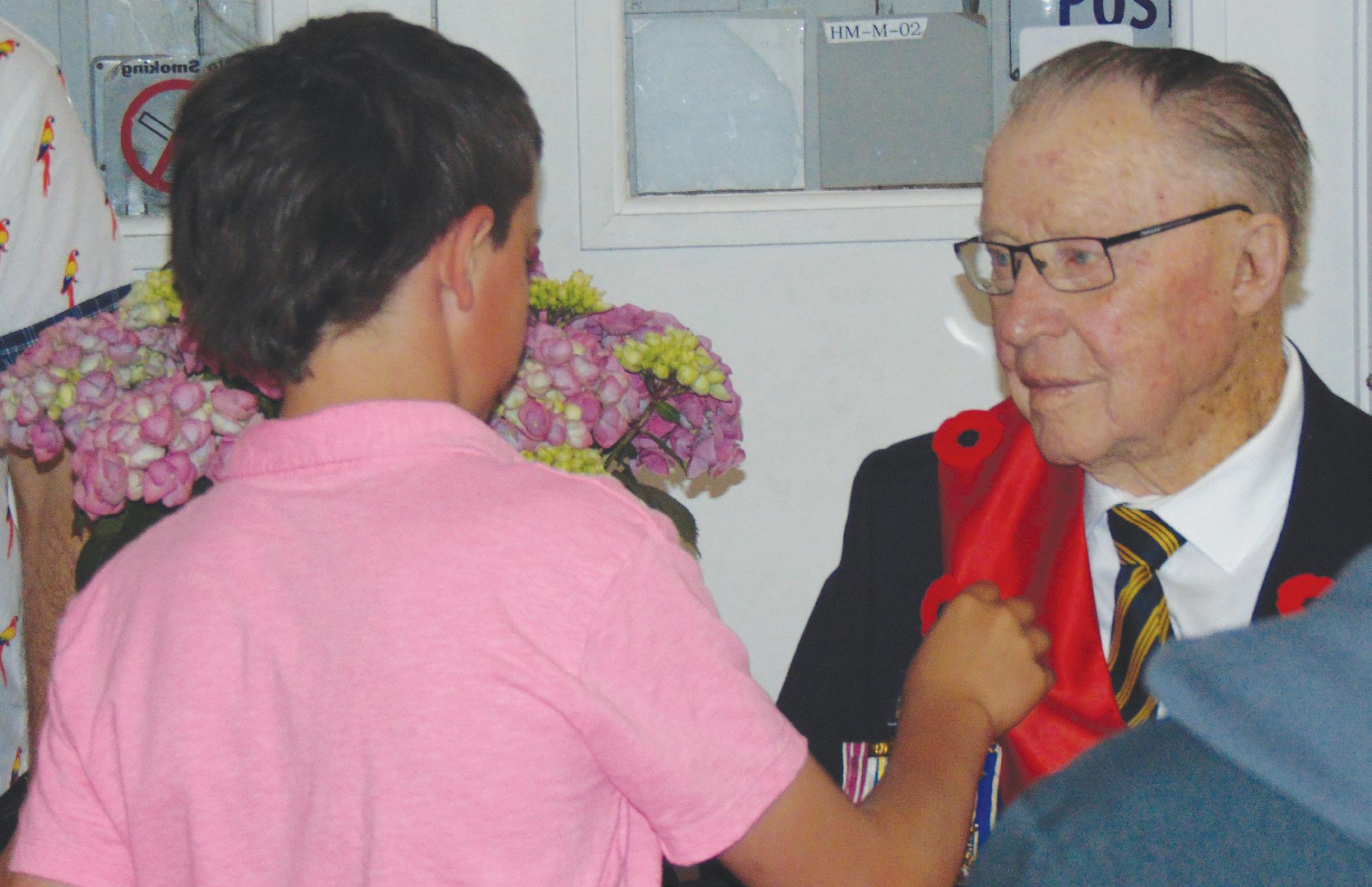
If any of you have seen pictures of Ed at important functions, you would always see him wearing his jacket covered in his military medals.
On this day he took off that jacket and donated it to the historical museum,
which dressed their mannequin in the jacket and beret improperly. After taking a good look at it, Ed noted that the buttons were done up crooked and the beret was not at the right angle! It is on display at the museum for viewing.
It was a wonderful celebration for a wellbeloved man.
Saskatoon Theological Union offering new shared program
By the Rev. Dr. Iain Luke Principal, College of Emmanuel & St. Chad
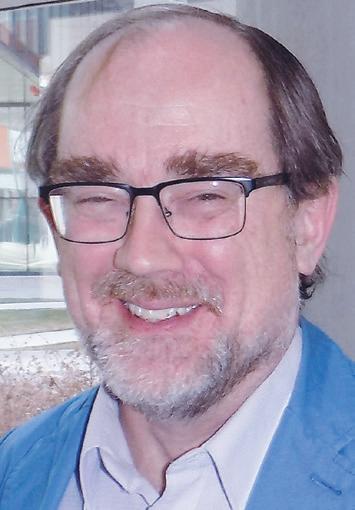
This fall marks the beginning of a new curriculum at the College of Emmanuel & St. Chad, in partnership with our colleagues at St Andrew’s College and Lutheran Theological Seminary.

For the first time, the three colleges of the Saskatoon Theological Union (STU) will offer a single, shared program for students pursuing the degrees of master of divinity and master of theological studies.
For decades, each college has opened its classrooms to all STU students, but these shared degrees include several new developments. First and most important, all STU faculty members contributed to the design of the program, so
individual courses will reflect a range of perspectives, drawn from the different denominations and academic disciplines represented in the common faculty.
Shared teaching, wherever possible, will reinforce this approach. Some courses are teamtaught, while others feature ecumenical panels, or guest speakers offering fresh takes from other subject areas.
The course format is also changing. Instead of offering several semesterlong courses on a weekly schedule, our new courses will adopt an intensive style. Classes will meet for
a week of full days, or two weeks of half-days.
On average, one course will take place in each month, allowing time for pre-course preparation and post-course assignments.
The intensive approach is one that has proven successful and attractive in the January course on the gospels, which ESC has offered for about 20 years. Educators have found that the immersive quality of this kind of teaching is more effective for most students.
We anticipate it will also be more accessible for present-day students, who typically have family and job commitments that make weekly classes
impractical.
To improve access, almost all courses will be in a hybrid format, meaning students can attend in person at the College buildings, or participate remotely by Zoom.
In the 2023-24 academic year, seven new courses will be offered at an introductory level, along with two colloquia where students bring together their learning and experience from the different subject areas.
Advanced courses continue to be available, and more will be developed as the new curriculum rolls out.
As always, the college encourages people who would like to try out theological studies to enrol as occasional students, in order to take one or more courses. These courses can be applied for credit should you then wish to pursue a degree.
A list of this year’s
courses follows. Please contact the college’s registrar, Lisa McInnis at 306-9753753 or esc.registrar@ saskatoontheolgicalunion. ca for details to enroll.
What is the Good News? (Aug. 28-Sept 1): A historical and theological approach to how the Christian message has developed, from its beginnings to the present.
Who is the Church? (Sept 11-22): An exploration of how we understand the Christian communities of which we are a part, from the local to the global.
Introduction to Biblical Literature (Nov 13-24): Discovering the literary, religious, historical and social contexts from which the Bible emerged, the better to understand and interpret Scriptural texts.
Spiritual Practices for Compassion and Resilience (Dec 4-8, Jan 8-12): Introducing a range Continued next
10 The Saskatchewan Anglican September 2023
A grandchild of veteran Ed Laird (left) places a poppy on his grandfather's sash during the latter's 100th birthday celebration in Prince Albert. Photos by Mary Brown
A mannequin at the Prince Albert Historical Museum wears the uniform of veteran Ed Laird, who donated it during his 100th birthday party.
page
Food bank in Shaunavon feeding residents' tummies — and souls
By Sandra Wood SHAUNAVON
(Qu’A)
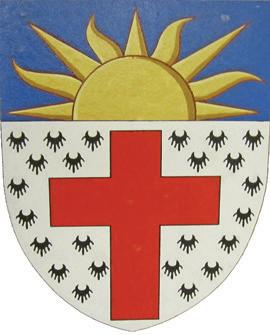
— The food bank in Shaunavon, in southwest Saskatchewan, is a busy place.

Situated in All Saints Anglican Church since 2015, it is staffed by about 10 volunteers from six local churches. The food bank is open two afternoons each week, and serves 58 families, who each can collect a hamper every two weeks, as well as picking up dairy and bread products more often.
The Food Bank receives dairy and bread donations from the local Co-op, and food and money donations from residents.
In addition to serving the town of Shaunavon, the food bank sends food once a week to nearby communities of Eastend, Frontier and Climax.
Continued from page 10 of spiritual practices drawn from cultural contexts, in order to equip students for their own prayer life and ministries, as well as for equipping others.
Public Practical Ministry (Feb 5-16): An overview of planning worship, preaching, and basic faith formation for worshipping communities, drawing on students’ experience in their home communities.
God and Suffering (March 4-15): Asking the basic question, “Who is God?” in order to probe the paradoxes and difficulties of life in the world, rooted in the experience of people and communities of faith.
... Saskatoon colleges' new courses CORRECTION

Contexts, Cultures and Differences (April 8-19): Examining how ethical and theological values relate to our settings, contexts, identities and backgrounds, in order to support ministry in an environment where people come from many different perspectives.
Methods for Interdisciplinary, Ecumenical Theological Education (Jan 15-19, Apr 22-26): A colloquium where students work through the connections between different subject areas, and explore the how and why of studying Christian theology in ecumenical, interfaith and pluralist settings.
Incorrect information appeared in the June issue in a photo caption. On page 11, pictured with Bishop Michael Hawkins are Don and Catherine Skinner, not Ruth. We apologize for the error.
September 2023 The Saskatchewan Anglican 11
Volunteer Sandra Wood and Archdeacon Lauren Miller have a laugh while
Miller visits the Shaunavon Food Bank, housed in All Saints Anglican Church.
Photo by Archdeacon Catherine Harper
Find
Grow in Faith
College of Emmanuel and St. Chad and WECAN release 202324 Licentiate in Theology schedule
Submitted




Emmanuel and St. Chad College has been collaborating with the Western Education Collaborative Anglican Network (WECAN) group to develop a ministry preparation program that is relevant to the various Anglican contexts in Western Canada.









The local diocesan ministry schools make substantial contributions to the program by offering courses mapped out in the ESC-WECAN Licentiate in Theology handbook.
Whether you are feeling called to do more formal ministry or are drawn to taking certain courses, please contact the person named for the course or courses you are interested in doing.
At the same time, let your diocesan school co-ordinator know your plans.

Also, watch for the ESCWECAN L.Th. Website to be launched late this summer!


For more info or to register for courses, please contact the ESC-WECAN L.Th. implementation co-ordinator, the Rev. Dr. Trish McCarthy at trish. mccarthy@saskatoon theologicalunion.ca or 306370- 8378.

FALL courses
Introduction to Theology: The Diocese of Qu'Appelle, 6 to 8 p.m. on Tuesdays in Oct. 3, 17, 31;
Nov. 14, 28; Dec. 12. Taught by Dr. Joel Houston of Briercrest College. See in-depth course description. School co-ordinator: the Ven. Dr. Catherine Harper at archdeacon.catherine@ sasktel.net.
History of the Christian Church: Saskatoon Diocese with the Rev. Dr. Sandra Beardsall, Fri. Sept. 8 from 7 to 9 p.m., Sat., Sept. 9 from 9:30 p.m. until 4 p.m., Fri. Sept. 22, 7 to 9 p.m. and Sat. Sept. 23, 9:30 a.m. until 4 p.m. School co-ordinator: the Rev. Dr. Trish McCarthy.
WINTER courses

Anglicanism: Kootenay Diocese and ESC taught by Archbishop Lynne McNaughton. Course co-ordinator: the Rev. Dr. Iain Luke at iain. luke@ saskatoon theologicalunion.ca.
Indigenous Relationships and Wisdom and Teaching of the Elders: Henry Budd College and the Diocese of Brandon. School co-ordinator: the Rev. Dr. Kara Mandryk at kdmandryk@gmail.com.
Introduction to the Bible: College of Emmanuel and St. Chad. January and February. Format and dates under discussion. School coordinator: the Rev. Dr. Trish McCarthy.

12 The Saskatchewan Anglican September 2023
the resources you need to
selection of books
Gifts for baptism, confirmation and more!
Devotional articles
Home decor
Candles including 100% beeswax
School and church resources 437 2nd Avenue North Saskatoon, SK S7K 2C1 Local 306.384.1924 Toll Free 1.888.316.8648 info@ucssask.com www.ucssask.com
• Amazing
•
•
•
•
•
By their fruits shall ye know them: St. Mary hosts berry festival
By Deacon
Christine Burton
REGINA — “The kindly fruits of the earth … .”
It was that phrase, part of the Great Litany in the Book of Common Prayer that inspired Rev. Canon Claude Schroeder to establish St. Mary the Virgin’s – and Regina’s – first Saskatoon Berry Festival, held on a perfect summer’s day on July 29.
While St. Mary is involved in community events such as the Cathedral Village Arts Festival, the parish community was looking for new and innovative ways to engage their neighbours and the Regina community generally, as well as raising some funds.
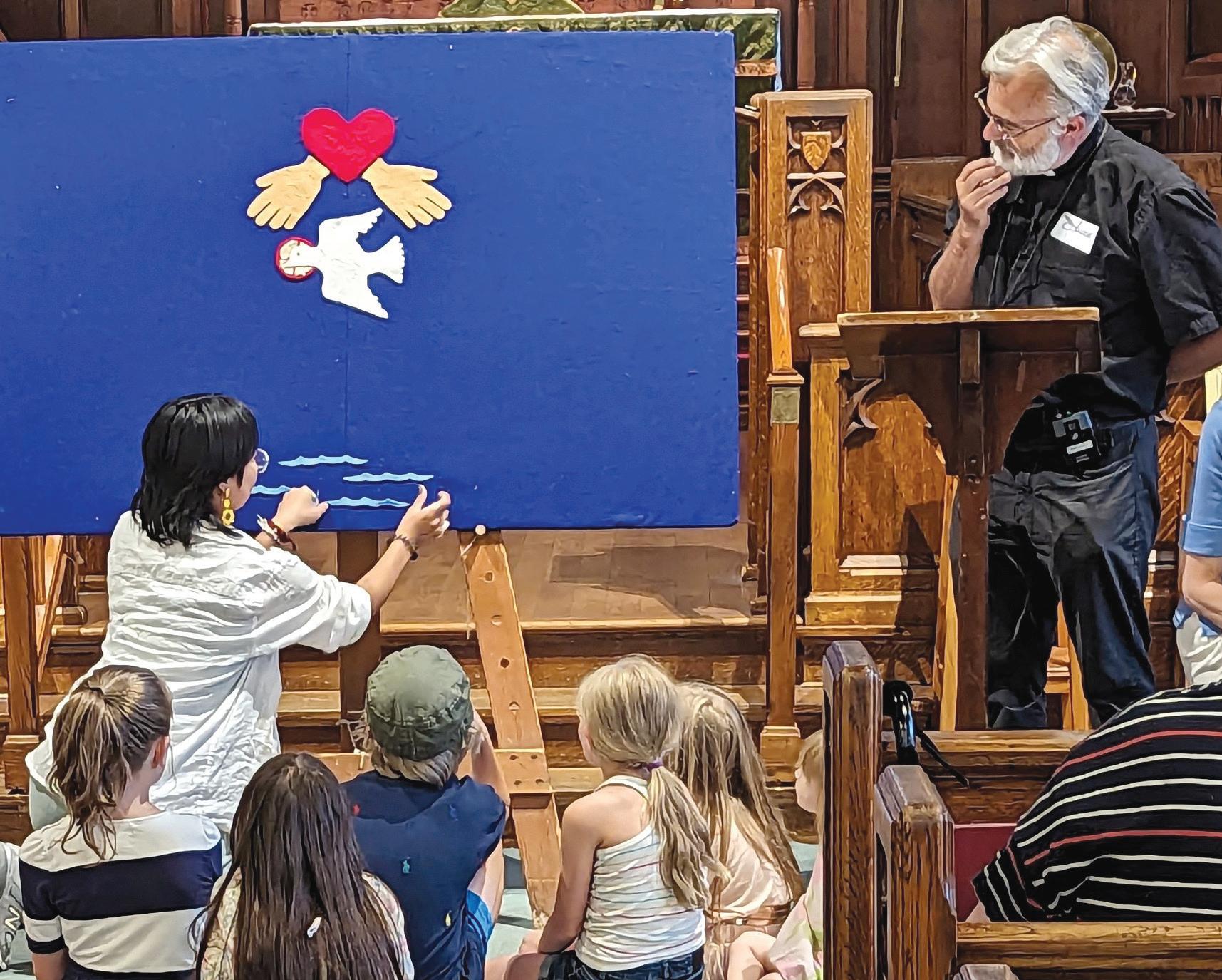
“The intercession says, ‘That it may please thee to give and preserve to our use the kindly fruits of the earth, so that in due time we may enjoy them, We beseech thee to hear us, good Lord,’ so I was receptive to the movement of the Holy Spirit to consider a fruit-based event at St. Mary’s,” says Schroeder.
“And saskatoons — a local crop produced by local farmers — seemed especially appropriate to us who live in the prairies and for whom agriculture is such an important and immediate part of our lives.”
Reaching out to
local growers, Prairie Berries, in Keeler, Sask., arrangements were made to bring in fresh frozen berries and freshly baked saskatoon pies, as well as other saskatoon products, including syrup, jam, and chocolate-covered berries.
But saskatoons were only part of the equation for Schroeder and his parish team of volunteers.
“Saskatoons are not just locally raised, they’re part
of our history and heritage in Saskatchewan.
"They were a critical part of the diet of First Nations people prior to the arrival of Europeans, and were an important ingredient in pemmican, and in bannock, a staple of the First Nations and the Metis peoples. We wanted to honour and respect that dimension as well.”
With that in mind, the parish invited members of
the Aboriginal Christians’ Association to come and teach children — and adults! — to make bannock over a fire.
Andrew Davis, one of the event volunteers, also arranged to bring in and sell products gathered and packaged by Boreal Heartland Herbal Products Inc., an Indigenous company based in Air Ronge.
“We knew Boreal
Heartland was an initiative of Keewatin Community Development Association, and we could totally get behind KCDA’s mission to support career, education, business, and economic development in northern Saskatchewan.
"And their unique products were an added attraction for our event.”
As if that wasn’t enough, the festival also hosted a coffee house where folks could enjoy a piece of saskatoon berry pie with a scoop of ice cream, and coffee, tea, or homemade lemonade, while listening to local musicians.
Rene Dumont is a Cathedral Village-based Metis folk singer whose grandmother came from Batoche. His good nature and upbeat music had folks laughing, while recording artist Glenn Sutter, reminded those listening about the importance of respecting and protecting creation.
The final musical act, Empire Associates, was especially appreciated as husband-and-wife duo Terrance Williamson and Kelsi Kerestesh are also parishioners and musicians at St. Mary.
Children certainly weren’t forgotten as, in addition to the bannock making, they were invited to take part in painting a creation mural outside, Continued on page 14
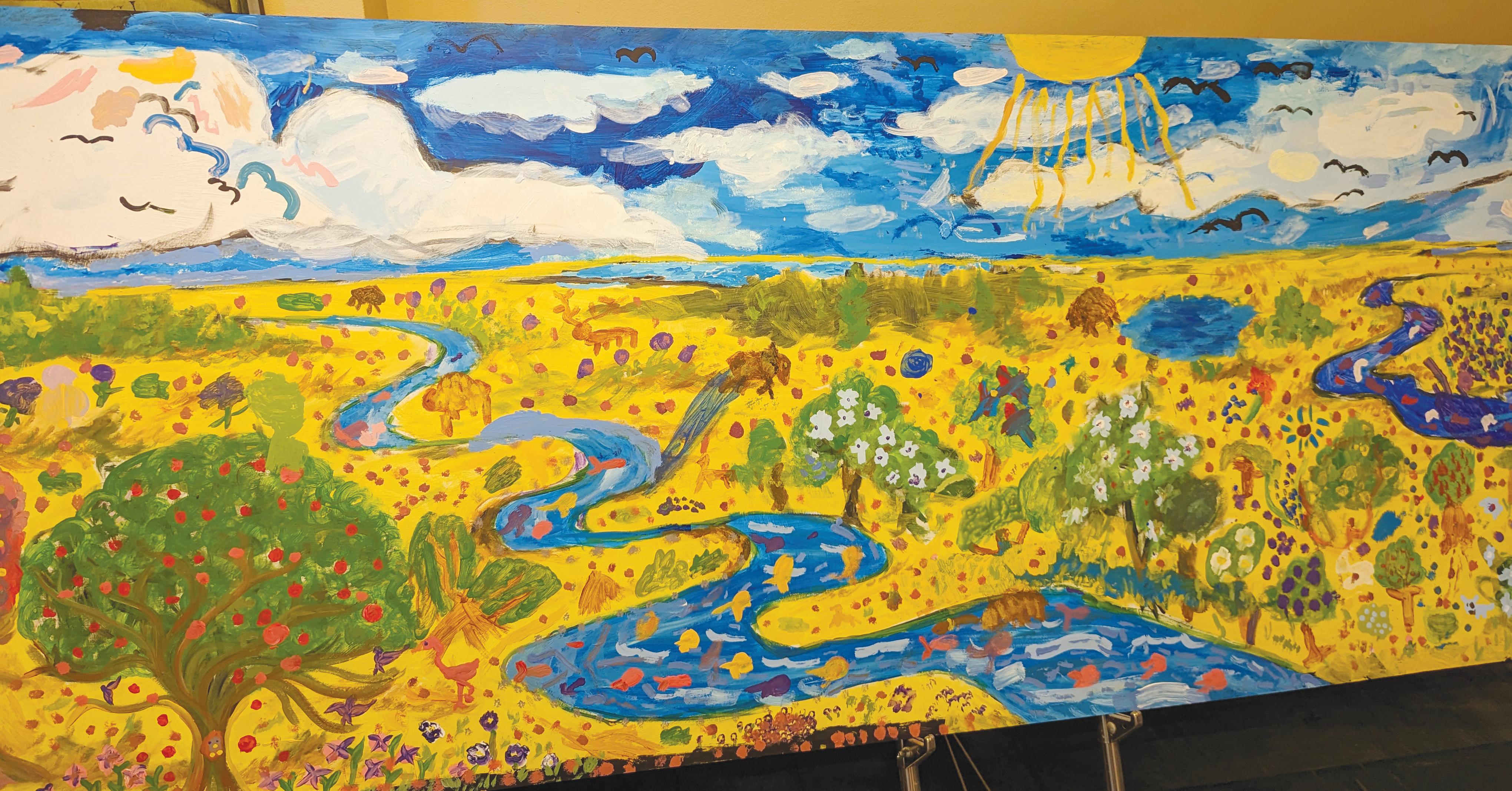
September 2023 The Saskatchewan Anglican 13
Children and some adults created this mural during the Saskatoon Berry Festival at St. Mary's, Regina. Photos by Terrance Williamson
Emma Derr adds water to the felt board showing the story of creation during Family Vespers, held at the conclusion of the Saskatoon Berry Festival at St. Mary, Regina in July. Canon Claude Schroeder, standing, looks on.
... Phrase in Book of Common Prayer inspires berry festival
Continued from page 13 facilitated by Emma Der, herself a parishioner at St. Mary since childhood.
The lawn outside the church was also populated with chairs for those who found the crush of people inside the hall a little too warm.
Estimates are that some 500 people came through the coffee house alone.
The day concluded with a vespers service in the church proper. “This was really the ‘final destination’ of the day,” Schroeder pointed out, “to remind folks of who we should be thanking for our saskatoons and the good gifts of the Earth.”
He also recalled, “I showed one woman around who told me the church reminded her of her home in Hungary. When I said we would be holding a vespers service, she immediately wanted to come.
"And throughout the afternoon I was blessed to make new
Clearly the city was ready for a Saskatoon Festival as, despite using only “free” advertising, the event was a smashing
success, with people arriving well before the start time, pies selling out within minutes, and berries not long after,
despite ordering more than 100 additional units on “spec.”
“I wanted it to be a success, I expected it to be a success, I had faith that the Holy Spirit had led us to this, and thus would help ensure it was a success; but you’re always a little nervous just before things start,” said John McGregor, event chairman.
“And the Holy Spirit did not let us down! Some of our parishioners donated their pies back to the church so we could sell them, and we still could have sold another 100! We’ll keep that in mind as we plan next year’s event.”
At times the sound of people talking in the hall was overwhelming; the people managing the distribution of the pies and berries never had a chance to sit down; the ticket sellers had lineups out the door; those serving the refreshments were run off their feet … and everyone most certainly enjoyed the kindly fruits of our Earth!
Feeling the Holy Spirit Guided into all truth: The Holy Spirit in one of our founding documents
By Rev. Gene Packwood
Fall launch time.
Bit of an oxymoron actually.
As nature begins shutting things down for the winter rest, the Church revs up, as we strive to plant and launch and grow.
A good time to get back to basics, though, and to remind ourselves of some foundational Canadian Anglicanism and what we’re about.
Some years ago, as part of my involvement with Anglican Renewal Ministries (ARM) Canada and our mission — rediscovering the Holy Spirit’s presence in our lives and in the Church — and thanks to having searchable PDF versions of The Book of Common Prayer and The Book of Alternative Services, I made an index of all the references to the Holy
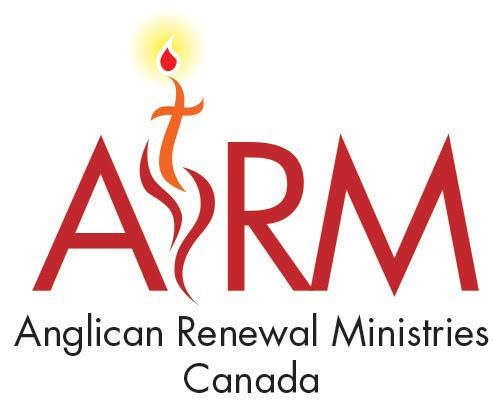
Spirit in them. I found over 400 in The Book of Alternative Services and more than 300 in The Book of Common Prayer.
There are plenty of instructive occurrences over and above the standard “In the Name of the Father, Son and Holy Spirit (Ghost)” invocations.
Two of those occurrences, I was intrigued to find, are in the SOLEMN DECLARATION 1893 in the first few pages of The Book of Common Prayer (p. viii) right after the Title Page, Table of Contents
and Preface. Although a foundational document for the Anglican Church of Canada, it is not a text used for personal devotions or spiritual growth.
I suspect there are many Anglicans who have never even heard of it let alone read it.
Yet it opens with these words: In the Name of the Father, and of the Son, and of the Holy Ghost. Amen.
An invocation and a prayer.
The very first, dare I say, fighting words of our prayer book, are a foundational invocation of the Holy Trinity.
We begin with that profound mystery. Such is the Holy Spirit. Such is the Father and the Son.

We worship one God in three Persons. Indivisible.
So when we focus on one Person, we do not deny or diminish the others.
To be filled with the Holy Ghost is to be filled with all the fullness of God. And that is about as far as I dare go with that, except to say it is the very best way to begin our expression of the Anglican church.
The next reference is in the third paragraph; a declaration that this church will “worship One God and Father through the same Lord Jesus Christ, by the same Holy and Divine Spirit who is given to them that believe to guide them into all truth.”
Believe, and I am given that Holy and Divine Spirit to guide me into all truth.
What is truth? I am, says Jesus (John 14:6), God’s word is (John 17:17), and truth is in Jesus,
writes Paul (Eph 4:21). Not only that, but the Holy and Divine Spirit is the Spirit of that truth (John 14:17 and 15:26), and that pretty well wraps it up.
So, the foundational document of the Anglican Church of Canada (after the Scriptures and the prayer book) affirms and attests that it is important to have been given the Holy and Divine Spirit because he will guide us into Jesus.
Thus begins our trustworthy script for Anglican worship; a script that is essentially the Scriptures set to prayer. Give it a read and a ponder during this fall start-up.

As we learn our lines in worship and prayer, may we make them our own while daily increasing in the Holy Spirit more and more, until times of refreshing, renewal and revival come.
Amen and amen.
14 The Saskatchewan Anglican September 2023
The completed felt board showing the story of creation. acquaintances, renew friendships, and share the love of God with the many folks who thanked us for hosting the event.”
Rev. Michael Bruce says farewell to diocese during social event
By Joanne Shurvin-Martin
Primate to determine retirement date
By the Anglican Journal
After two votes against a resolution that would have extended her term, Archbishop Linda Nicholls told General Synod she would decide when to retire after resting.
“This is my first and last General Synod as your primate,” Nicholls told the gathering in closing remarks July 2. “Thank you for the privilege of serving in this office.
“I am of course disappointed that I will not have the opportunity to see the work of this General Synod completed and brought to General Synod 2025 ... ,” she said with visible emotion.
“I now have clarity with which to discern when I will retire—a decision I will make when I’m rested ... .”
The failed resolution— which General Synod voted down June 29, re-opened for talks on June 30 and vote down again—would have extended primatial terms to the next General Synod when it falls within a year of the primate turning 70. Nicholls must quit by October 2024.
REGINA
— More than 30 people attended an informal wine and cheese evening on July 14, to bid farewell to Rev. Michael Bruce and his wife, Heather, before they moved to London, Ont., where Bruce is rector of St. James Westminster.

Canon Cheryl Toth and Deacon Christine Burton organized the event, which was held at the Toth home in Regina.
Lots of good connections, good food and fun were enjoyed.
Bruce came to the Diocese of Qu’Appelle in 2015 and served the parishes of St. Luke, St. Matthew and Immanuel, in Regina, the rural parish of Plain and Valley, and was diocesan children and youth minister.

September 2023 The Saskatchewan Anglican 15
Rev. Michael Bruce, centre, with his wife, Heather, talks to a former parishioner during a farewell event.
Photo by Joanne Shurvin-Martin
Barriers and boundaries
By the Rev. Canon Marie-Louise Ternier
Barriers and boundaries unjust and necessary, demeaning and holy; which is which I ask gleaning and boldly.
When do barriers need to be broken and when are boundaries not to be token?
Barriers obstructing, boundaries fostering; do barriers always demean where boundaries protect, or do barriers also protect where boundaries defect?
Do barriers serve a noble purpose where boundaries fail to pose? While barriers can pose as boundaries belittling and dehumanizing, boundaries can pose as barriers honouring and protecting, carrying and concealing.
Barriers feed on fear while boundaries thrive on being near.
Boundaries open discovery, health and trust where barriers parade in threat, stealth and disgust. Barriers build great hiding places where boundaries reflect open faces.
Boundaries encourage respect and honour, a precious anointing by a kiss from the Holy, where barriers inflict and disguise, an insidious curse not worth the glory.
Boundaries bounce like a smiley wave dancing a circle of safety and trust. Prickly barriers block, resistant to change, keeping out the new and unknown is a must.
And if you’re confused ’bout boundaries and barriers track the energy stirred in your heart and you will know which one is doing its part.
QSMM hosting six-week intro course on theology
Submitted
Dates: October: 3rd , 17th , 31st November: 14th , 28 th December: 12 th

All course times: 6:00 - 8:00 pm, CST Zoom Link: https:// briercrest.zoom. us/j/89592205117
Course Instructor: Dr. Joel Houston jhouston@briercrest.ca
Course Description:
Introduction to Theology is a basic overview of the central doctrines of the Christian faith, designed for those who have no previous formal training in Christian theology or for those who need a refresher.
Our beliefs about the “ultimate reality” play a crucial role in our decision-making process, big or small. Our ideas about God, the universe, and human existence shape and guide us.
Introduction to Theology provides an opportunity to explore these significant questions in the Christian tradition. This course focuses on critical thinking, extensive reading, and the development of a theology that is both orthodox and life-giving.
The class pays attention to how Christian theology can be applied to various vocations, not just academic or pastoral careers.
Suggested Course Texts: (note: all required readings will be available to students electronically)
Kapic, Kelly M. A Little Book for New Theologians: Why and How to Study Theology
Downer’s Grove: IVP Academic, 2001. (126 pages).
Strahan, Joshua. The Basics of Christian Belief: The Bible, Theology, and Life’s Big Questions. Grand Rapids: Baker Academic, 2020. (230 pages).
McGrath, Alister E. ed., Theology: The Basic Readings. Oxford: Wiley Blackwell, 2018.
Course Outline:
Oct. 3: Course
Introduction, A History of Theology as a Discipline
Reading for class: Karl Barth, “Commentary”, Evangelical Theology: An Introduction
Oct 17: What is Theology? How and Why do we “do” Theology?
Reading for class: N.T. Wright, “On Scripture and the Authority of God”, https://biologos. org/articles/n-t-wrighton-scripture-and-theauthority-of-god.
Oct 31: The Doctrine of God: Who is God? Language, Analogy, and Creed.
Reading for class: John Behr, “One God, Father Almighty,” Modern Theology, 34:3, July 2018.
Nov 14: The Doctrine of Christ: New Testament language about Jesus, and the Person and Work of Christ.
Reading for Class: The Gospel According to St. Mark
Nov 28: The Doctrine of Salvation: What is salvation? Salvation from what? Models of Atonement.
Reading for Class: Miguel A. De La Torre, Liberation Theology for Armchair Theologians, Louisville: WJK Press, pp.1-20; Gustavo Gutiérrez, Essential Writings, Minneapolis: Fortress Press, pp. 23-29, 78-91.
Dec. 12: The Doctrine of the Holy Spirit: Person, Divinity, Function.
Reading for Class: Todd L. Miles “He Will Glorify Me: Evaluating the Pneumatology of Inclusivists and Pluralists”, SBJT 16.4 (2012), 74-95.
Course Requirements:
“Thinking About Theology” – Reflection Paper, 20 per cent
For the “Thinking about Theology” reflection paper, students are required to read Kapic’s “A Little Book for New Theologians” in full. Upon completion, they must write a 1,000-word paper (approximately three pages) that answers the following questions: what is theology, why
is it important to study theology, and how should we study theology (including the characteristics of faithful theological study)?
While students may incorporate their own thoughts and opinions, they are encouraged to reflect on Kapic’s work. A good paper will showcase critical thinking and self-reflection, taking into account Kapic’s arguments.
Additionally, students must sign a declaration indicating that they have read the entire text, which can be included after the paper.
Paper Due: Dec. 12
Source Reflection
Journal – 30 per cent
Students will receive several primary and secondary sources to read and analyze. As part of their coursework, students must write a 300-word journal entry for each source, totalling around 1,800 words for six sources.
These entries can include a summary of the text’s central idea, personal impressions, and any questions for further consideration. The journal can be an electronic document, preferably in Microsoft Word or a handwritten journal. The entries will be evaluated based on their ability to accurately summarize the main idea and the level of thoughtful reflection.
Source Reflection
Journal Due: Dec. 12
Research Project – 50 per cent
As part of the class, students will choose a topic from the curriculum and conduct research on it. While a traditional research paper is an option, students are encouraged to get creative and explore other formats such as podcasts, visual art, poetry, or music.
If a research paper is chosen, it should be five to seven pages long and based on at least three sources. Before beginning research, students must obtain approval of their topic and chosen format from the instructor.
Due Date: Jan. 12, 2024
16 The Saskatchewan Anglican September 2023
Stewards of God's abundance
Growing our gardens, growing in stewardship
By Canon Cheryl Toth
By September, gardens are in harvest, yielding what they have to give us. Whether it’s tomatoes ripening in the late summer sun, carrots offering their orange snap to our meals or Michaelmas daisies preparing to bloom, September gardens have a particular sweetness.
We know the growing season is coming to an end and an early frost can change things overnight. It’s in September that we really know how our garden has fared. In most seasons, it’s also a mix of disasters and victories.
St. Mary, Whitewood holds Rogation Sunday service
Archdeacon Wilma Woods blesses a pine tree planted in memory of Queen Elizabeth II, in the church yard of St. Mary the Virgin, Whitewood. Woods returned to her former parish for a special service on Rogation Sunday, which was also Mothers’ Day. Parishioners brought seed packages to
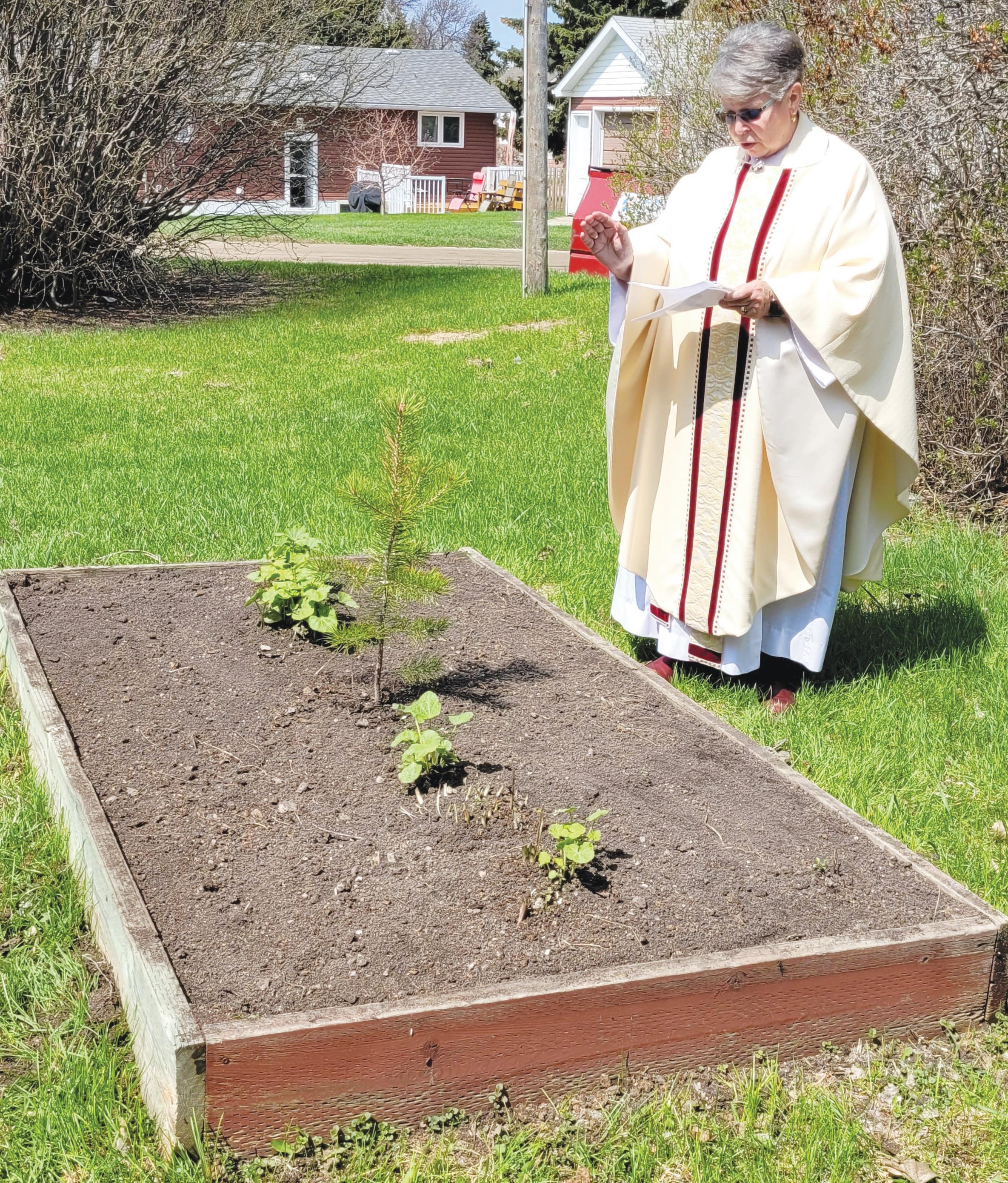
be blessed during the service, as well as symbols of seeds already planted. All women of the parish were presented with bedding plants, in thanks for their service in the church. A barbecue and potluck lunch followed the service, with time for the 19 parishioners to visit.
Out of the Depths – Living in Hope

Save the Date
Lutheran Anglican Women’s Retreat Saturday, October 21st, 2023
9:30 a.m. – 4 p.m.
Emmanuel Anglican Church
607 Dufferin Ave.
Registration is $20 (bring your own lunch)
For more information or to register, Contact: Bev Otsuka, (306) 227-9102 or email, bevotsuka@shaw.ca
Jesus understood that. His parables are full of references to fields and gardens, agricultural images His hearers would readily understand. The Parable of the Sower compares the kingdom of God to a sower vigorously and generously broadcasting seeds by hand.
Some seeds were eaten by birds, some lived a short time before dying from lack of moisture, some were choked by weeds and some yielded a good crop. After saying this, Jesus says to the crowd, “Let anyone with ears listen!” (Matthew 13:9).
Jesus is not telling them to physically hear Him, but to hear what His words say to them about how God’s kingdom works. Despite all the disasters of the sower’s seeding, the bounty is amazing. God will bring about a harvest.
Yet the parable also leaves us with questions to consider. How are we to work with God in the field of God’s kingdom? Are we the seeds? The soil? Both? Through the Gospel writers, the early Church had its own understanding in which the seeds were different types of people in their response to the word of God (See Matthew 13:18-23).
There is a lot of wisdom in that interpretation. I think it can be applied to stewardship — but with a twist. In terms of stewardship, we are all the seeds, often at the same
time. Here’s why.
From the very beginning of the biblical narrative, humans are called by God to walk in God’s way of right relationship with God, with the Earth and with our fellow creatures.
The first creation story shows us formed in God’s image and tasked with caring for the Earth as God’s stewards. The prophet Micah outlines our mission in clear terms:“God has told you, O mortal, what is good; and what does the Lord require of you but to do justice, and to love kindness, and to walk humbly with your God?” (Micah 6:8).
While our call may be clear, our response is often muddied. Jesus’ parable gives us some reasons why that is.
God, the Sower, generously gives us many opportunities to serve God and our world. Some of the time, an opportunity presents itself in the form of a crisis or issue of injustice that comes to our attention. To use a present example, in the midst of climate change, there is a profound drought happening in the Horn of Africa, which is putting the people of Ethiopia, Somalia, and northern Kenya on the edge of famine.
Tens of thousands have died and the livestock of the herding people has been decimated. When we hear about something like this on a newscast or read about it online, we often have a desire to help. We may even make a donation to an agency such as the Primate’s World Relief and Development Fund (PWRDF).
But, just as frequently, it is a passing thought or a mention in our daily prayer. Then, like seed sown on a path and snatched by hungry birds, our concern is gone. We may even forget the crisis is happening.
Or, our awareness lasts a little longer and we make an effort to learn more. We might check the PWRDF website to learn about what is happening or ask what efforts are being made in our diocese to
Continued on page 18
September 2023 The Saskatchewan Anglican 17
Photo by Joy Newman
Being good stewards
Continued from page 17 assist. Yet, keeping up with the latest developments can be difficult and we are concerned that any donation we make “gets into the right hands” so we hesitate. Like seed sown in rocky soil, our growing interest is short-lived and we fade away in the face of difficulty.
Or, we persevere in our effort to understand the situation and learn what responses aid agencies and governments are making. We may discover some local relief efforts supporting those in need and connect with them.
We may share what we are learning with others and try to raise some awareness about the lack of food and water killing tens of thousands of people each year. We make another donation or perhaps even sign up to do so monthly. We are growing in our stewardship effort.
But we have busy lives and lots of worries of our own. It’s hard to stay focused on something happening so far away when there are personal and community crises close at hand. Like the seed growing amidst weeds choking out its life, we are producing a yield although it is less than our full potential.
Or, we realize that our own concerns are crowding out our concern for others and we refocus. We take what we have learned and approach someone in our parish or community to see if we can do something together.
We contact PWRDF or
the Canadian Foodgrains Bank for material we can give to others to help them understand the need.
We come up with a fundraising idea, taking the produce from our garden and creating goods to sell after church to raise some money and some awareness of the issue. We raise our monthly donation by cutting back on something we don’t really need so others can survive.
Like the seed sown on fertile ground, our efforts are beginning to make a difference.
Where are you in this story of the seeds? As we grow in stewardship and our care for others and the Earth, we can be every kind of seed in the course of a few months. Revisiting Jesus’ parable of the sower and the seeds enables us to listen to God’s call in our life.
Asking the question about what kind of seed we are is a way of understanding how we are being stewards right now and seeing if it’s where we want to be. Stewardship, like gardens, is about growing. How do you want to grow?

To learn more about the very real multi-year drought choking the life from people in Africa, go to www.pwrdf.org or www.
foodgrainsbank.ca
Canon Cheryl Toth is a retired priest in the Diocese of Qu’Appelle and its former stewardship officer. She loves to garden and is currently fighting a battle against lily beetles destroying her lilies as they bloom!
Moose Jaw Co-op, SaskWater launch campaign to support church's lunch program
By Moose Jaw Express staff
MOOSE JAW (Qu'A) — Moose Jaw Co-op Food Store teamed up with SaskWater to launch Project Shine for August, with donations matched up to $5,000 to benefit the weekend lunch program at St. Aidan Anglican Church.
The campaign launched Aug. 1 at the Co-op Food Store tills.
“Our lunch project was a response to COVID, and we serve lunch on weekends, just bagged lunches from the door,” explained Nathan McLean, who helps coordinate volunteers for the program.
“COVID is behind us now, but we’ve seen the need in the community and decided to continue on. We’re 100 per cent driven by volunteers. ... We have, I think, eight different teams on a rotation. Depending on the season, they’re serving between 30 and 70 lunches each day for folks on the street and in our community.”
All the funding for the program comes from grants, donations, and
anything extra that can be scraped from the church’s budget, McLean said.
During the summer, the lunches were available on the steps of St. Aidan from 10 to 10:30 a.m. on Saturdays and Sundays. The program supports anyone in the community who is struggling with food insecurity.
“Michaela Turner is a good friend of mine, and we hold very similar positions, her at the Co-op and myself at SaskWater,” Courtney Mihalicz said. Mihalicz is the corporate communications manager at SaskWater, headquartered in Moose Jaw, while Turner is the Co-op’s local community relations manager.
“Part of our roles is to manage our organizations’ community investment or sponsorship programs,” Mihalicz continued, “and we were discussing that we had both received a request to support the weekend lunch program, and we started to brainstorm how we could work together on it.
"That’s where we came up with the till campaign, and from there our campaign name of ‘Project
Shine,’ with the aim to strengthen, unite, and nurture our community.”
“At Moose Jaw Co-op, we believe that everyone deserves access to nourishing meals,” said Geoff Anderson, general manager of the Moose Jaw Co-op. “Unfortunately, not everyone has this privilege, and that’s where the Weekend Lunch Program comes in.
“This vital program operating out of St. Aidan Church provides healthy sandwiches to individuals in need every Saturday and Sunday, ensuring they receive proper sustenance and a sense of support during challenging times.”
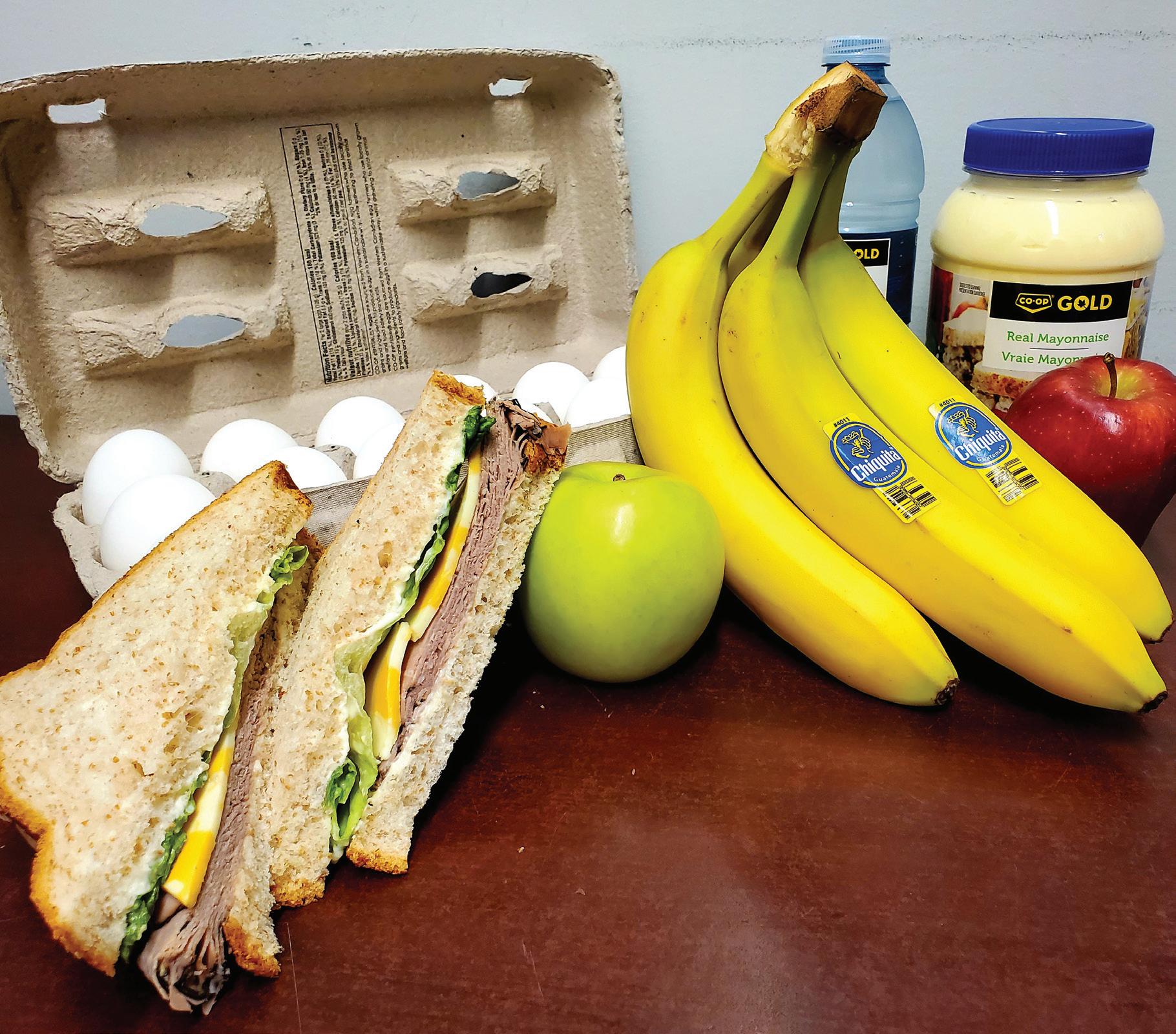
SaskWater and Co-op will collectively match all member and customer donations at the Food Store tills in August up to $5,000.
“This is huge. We wouldn’t be able to do the lunch program without outside funds and support,” McLean said. “In fact, we just received what you might call some bridge financing that will get us through to the fall, and then, well, we don’t know, right? Continued next page
18 The Saskatchewan Anglican September 2023
...
Gardening.
Photo by Markus Spiske/unsplash.com
Bagged lunches offered at St. Aidan have become a vital part of supporting people in Moose Jaw who are food insecure.
Photo by Moose Jaw Co-op
Project Shine supports Moose Jaw church's lunch program
By Moose Jaw Express staff
MOOSE JAW (Qu'A) —The team co-ordinating the weekend lunch program at St. Aidan Anglican Church is preparing to help with Project Shine when it launches Aug. 1 and to receive help in turn from employees at Moose Jaw Co-op and SaskWater.
“We’re partnering with the Co-op (Food Store) and SaskWater to serve our community lunches on the weekend,” explained Nathan McLean, who helps co-ordinate volunteers for the weekend lunch program.
“As part of that, we’re fundraising through a till campaign, and on August 12 the volunteers from our lunch program will come and bag groceries for people and hopefully make some nice connections there and maybe tell people a bit more about what we’re doing and how we serve the community.
“And that will kind of launch our campaign.”
The weekend lunch program, begun during COVID, has become a vital part of the community for people struggling with food insecurity — a number that continues to rise, according to the Moose Jaw & District Food Bank.

Volunteers co-ordinated by St. Aidan serve lunches from the church’s steps on Saturdays and Sundays from 10 to 10:30 a.m. during the summer. The lunches are free for anyone who needs them. Usually it’s sandwiches, but sometimes there are smokies or bowls of chili as well.
On Aug. 1, the Moose Jaw Co-op and SaskWater
launched what they have called Project Shine. For August, Co-op Food Store customers will be able to donate to the lunch program at the checkout till.
In partnership with SaskWater, the Co-op will match donations up to $5,000, giving the program much-need funding to continue.
In return for the help at the Food Store on August 12, employees from the Coop and SaskWater will join volunteers at St. Aidan on August 19 to help prepare and serve lunches.
“That will be the reversal, on Aug. 19, where they’ll come to see what we do,” McLean said. “They’ll participate in preparing lunches that day and handing them out to our community members. So, that will be good for them to get some exposure and get to know the guests we serve.”
PiT Count involvement
Unrelated to Project Shine, but occurring in the same time-frame, St. Aidan served as a base for the Aug. 26 Point-in-Time Count being organized by
... Supporting church's lunch program
Continued from page 18 “So, to have this support from these community organizations means a lot.”
“The Co-op is a leader in community support and SaskWater is so happy to be part of that foundation, to make a difference in the community where so many of our employees live and work,” Mihalicz said.
“This allows us to join forces and leverage additional support
for this initiative in particular, but also to build something long-term in the form of an annual campaign with the aim of supporting initiatives aimed at food scarcity and the needs of the unhoused in our community.”
The Weekend Lunch Program team are always hopeful for more volunteers for their program. With more volunteer teams, each team’s obligation becomes less — potentially only
every couple of months.
“We’d love more volunteers,” McLean said. “One caveat is that it’s a lot more helpful for us if people can form their own teams. Two to three people per team is the usual, and then we can just slot them right into our rotation, instead of trying to find a place for them on an existing team.”
To volunteer, call or text Nathan McLean at 306-531-2241
Square One Community, Inc.
The count will yield invaluable statistics about the number of people in Moose Jaw who lack reliable, safe housing.
It will include questions about housing insecurity, whether participants also take care of pets while homeless, whether they›re working, demographic information, and more.
Due to the importance of the lunch program and the generosity and commitment of its volunteers, McLean elaborated, a table will be
set up for the PiT Count during the day’s lunch distribution.
The weekend lunch program doesn’t just help people experiencing homelessness. Seniors, low-income families with children, people with disabilities, and others are feeling the strain of trying to feed themselves.
Volunteers for the program do not need to be members of the St. Aidan congregation.
To help with volunteering, text or call Nathan McLean at 306531-2241

September 2023 The Saskatchewan Anglican 19
A volunteer prepares chili for the weekend lunch program at St. Aidan.
Photo by Nathan McLean
'That's a Wrap' at Christ Church, Saskatoon
Members of the recent Christ Church Saskatoon extended book study on Thomas

Funeral,” celebrate the conclusion of many conversations about death and life and the road
by Chocolate, of course. Bon appetite!
Obituary
Alice Medcof was pioneer for women in the church
By the Anglican Journal
Canon Alice Medcof, an Anglican priest who helped found the International Anglican Women’s Network (IAWN)—an Anglican Communion group with a mandate to report to the Anglican Consultative Council on the work of women and challenges women face— and who served two terms as its chair, died July 13 after a short illness.

She was 88.
Part of the first wave of female priests in the Anglican Church of Canada, which began ordaining women in 1976, Medcof championed the role of women within the Anglican Communion.
She also brought the voices of Anglican women into secular spheres, accompanying Canadian groups to New York each year to participate in meetings of the United Nations Commission on
Alice Medcof.
courtesy General Synod archives
the Status of Women.
Bishop Riscylla Shaw, of the Diocese of Toronto, has been a member of the IAWN since her ordination in 2001. In an interview with the Journal she called Medcof, a longtime Toronto resident, the network’s “instrumental leader” in the diocese, describing the late priest as “kind, engaged, energetic and deeply faithful.”
Medcof “was a tireless advocate for equality” and “courageous, wise and humble in her accomplishments,” Shaw said.
“She was a faithful priest who helped pave the way through the early days of women in this role in Canada— she persevered …. [and] steadfastly, resiliently followed her call to serve God’s people in church leadership,” the bishop added. “She recognized our gifts and affirmed for us that we had a place in the patriarchal hierarchy of the Anglican church.”
The Rev. Margaret Rodrigues in the Diocese of Toronto served with Medcof on the executive of the IAWN Canadian section and called her colleague “a real pioneer.”
“Promoting the role of women in the church has never been a very easy thing to do,” Rodrigues said, adding that Medcof “made sure that the
role of women … was increasingly recognized as important in the decision-making of the Anglican Communion and was the core of the whole thing.
“That was hugely important … and making sure that women from right across the Anglican Communion, not just women from Canada or the U.S. or the U.K. … (were) heard and recognized.”
Before entering the priesthood, Medcof had earned a degree in mathematics and worked in computer science. A career shift came when she began taking parttime divinity courses at the University of Toronto’s Trinity College, eventually obtaining a degree in theology.
In 1979 Medcof was ordained deacon and in 1980 priest in the diocese of Toronto.
In 1996, Medcof was among a group of women from 14 of the
Anglican Communion’s 32 provinces who helped found the IAWN. Medcof took over as chair in 2003.
“Many women across the Anglican Communion know of Alice Medcof because of her consistent work at the United Nations Commission on the Status of Women,” Mandy Marshall, the Anglican Communion’s director for gender justice, wrote in an online tribute.
“Alice was a regular participant ensuring women’s rights, championing the Christian faith and working to ensure gender-based violence was on the agenda of everyone along with human trafficking.” Medcof is survived by her husband Jamie, daughter Cathie, son Bill and three grandchildren. A memorial service was held July 21 at the Church of the Transfiguration in Toronto.
20 The Saskatchewan Anglican September 2023
Long’s opus, “Accompany Them With Singing: The Christian
of faith running through both. On the menu? Death
Photo by Rev. Mark Kleiner
Photo





























































